Silkie chickens have a special place in many people’s hearts. Whether you are new to chicken keeping or have kept hens for years, there is something about Silkies that makes them irresistible. Their soft, fluffy feathers, gentle nature and cute and quirky appearance mean they are often the breed people fall in love with first, and often one they never stop keeping. At Pipinchick, Silkies remain one of the most popular choices for gardens, family homes and mixed flocks, not just because of how they look, but also how they behave and how easy they are to keep.

What Makes Silkie Chickens So Special
Silkies are instantly recognisable thanks to their fluffy feathers, which feel more like soft fur than traditional chicken plumage. This unique texture comes from a lack of barbicels in the feathers, giving them their signature cloud like appearance. They also have dark skin, blue earlobes, and five toes instead of the usual four. These unusual features make Silkies one of the most distinctive chicken breeds you can keep.
Beyond their looks, Silkies are known for their calm, gentle temperament. They are friendly, slow moving and very people oriented, often choosing to sit near their keepers rather than wander far away. This makes them especially popular with families, children and anyone who wants chickens primarily as pets rather than purely for egg production.
The Different Types Of Silkie Chickens
One of the joys of keeping Silkies is the incredible variety of colours and patterns, all wrapped up in the same gentle, fluffy personality. Bearded Silkies are characterised by their full facial feathering, with soft plumage under the chin that gives them a rounded, teddy bear like appearance. This extra feathering adds to their charm and is one of the reasons Bearded Silkies are so popular with families and pet keepers.
Pipinchick Bearded Silkies are available in a range of colours, including black, blue splash, cuckoo, gold, gold partridge, lavender, porcelain, red, red pyle, silver partridge, true blue, white and white gold splash. Each colour has its own visual appeal, from the striking contrast of cuckoo feathering to the softness of lavender and the brightness of true blue. While colour does not affect temperament or care needs, many keepers enjoy building a visually varied flock, and Silkies are perfect for this.
You may also see Bearded Silkie hens listed as imperfectly perfect. These birds are just as healthy and full of character as any other Silkie, but may have minor cosmetic quirks that do not meet strict show standards. They make wonderful pets and are a popular choice for keepers who value personality over appearance.
Despite their different colours, all Bearded Silkies share the same core traits. They are calm, friendly and people oriented, preferring to stay close to familiar faces rather than roaming far. Their care requirements are the same across colours, making it easy to keep multiple varieties together in one flock.
Because Pipinchick focuses on Bearded Silkies within the Silkie range, keepers can be confident they are choosing birds bred for temperament, health and suitability for home environments rather than purely for show traits. This consistency is especially helpful for first time keepers who want predictable behaviour and care needs.
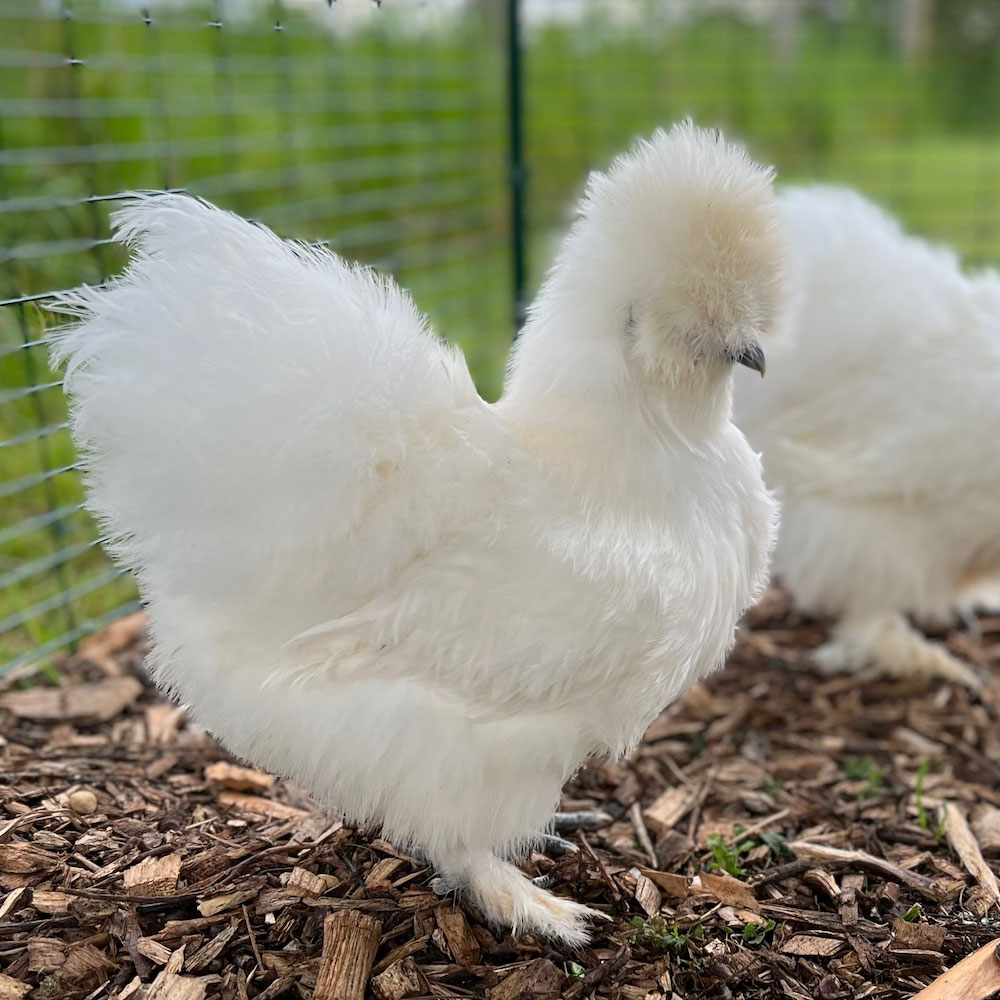
Silkie Eggs And Laying
Silkies are not kept for high egg output, but what they lack in quantity they make up for in charm. Silkie hens lay small to medium sized eggs that are usually cream or lightly tinted in colour. On average, you can expect fewer eggs per year compared to hybrid layers, particularly during winter months.
One thing Silkies are famous for is broodiness. They are among the best natural sitters of any chicken breed and are often used to hatch eggs from other chickens or even different poultry species. This strong maternal instinct is a joy for some keepers and a challenge for others. If you are happy managing broody behaviour, Silkies can be incredibly rewarding.
Silkies Make Great Family Pets
Silkies are exceptionally calm birds. They rarely show aggression, cope well with gentle handling and are happy to be part of daily life in the garden. Because they move slowly and do not fly well, they are less likely to escape or panic, which helps them feel safe around children and pets.
However, their gentle nature means they can be vulnerable in flocks with more assertive breeds. When keeping Silkies with other chickens, it is best to pair them with calm, non aggressive breeds and avoid mixing them with dominant hybrids.
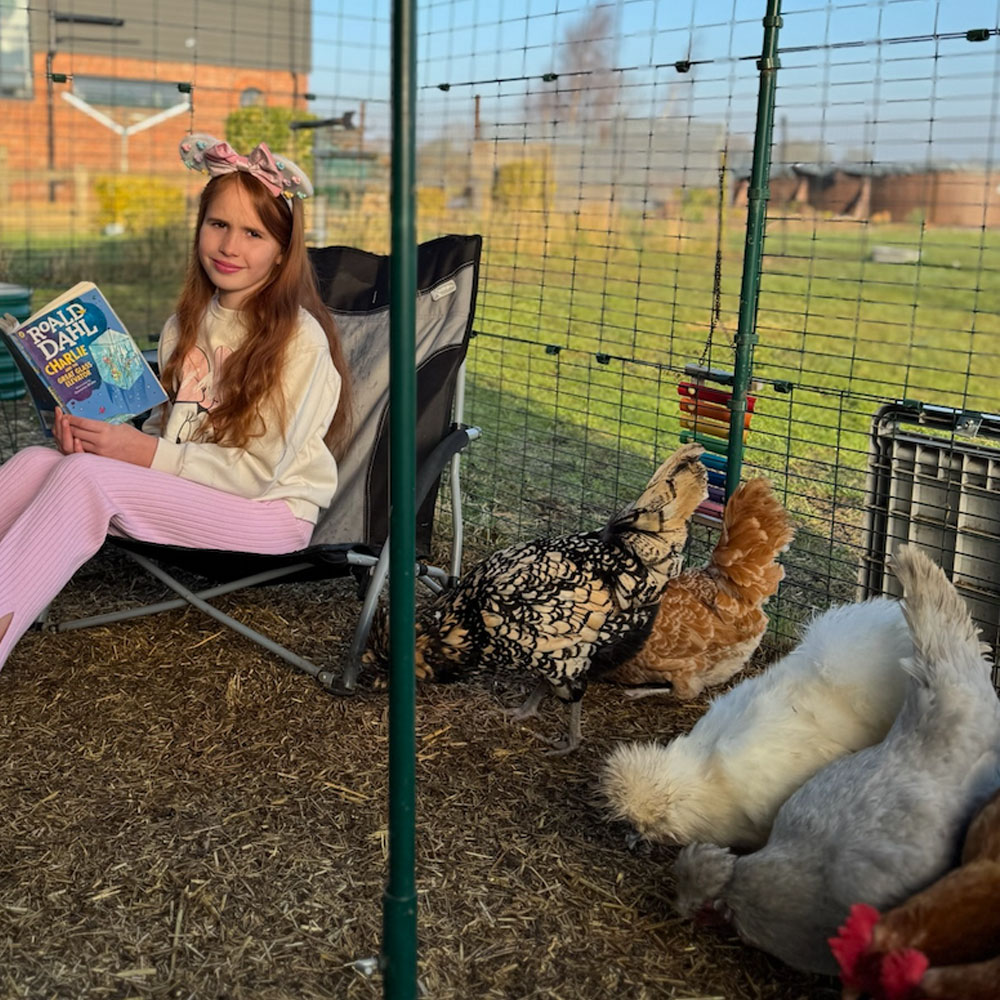
Housing And Care Tips For Silkies
Silkies may need slightly different care compared to other chickens, mainly because of their feather structure. Their plumage does not repel water well, so dry housing is essential. A well ventilated coop that stays dry during wet weather helps prevent illness and feather damage.
Because they do not fly well, perches should be low and easy to access. Ramps can help Silkies move safely between levels without injury. Clean bedding and regular coop maintenance are especially important for Silkies, as damp conditions can quickly cause problems.
In the garden, Silkies enjoy sheltered areas where they can dust bathe and forage without getting wet. Providing covered runs or natural shelter is ideal, particularly in the UK climate.
Feeding Silkies And Caring For Their Health
Silkies benefit from a balanced diet just like any other chicken. A good quality layers feed, fresh water and occasional treats will keep them healthy and content. Because of their fluffy feathers, it is important to check them regularly for signs of mites or lice, as parasites can hide more easily in dense plumage.
Routine health checks, gentle grooming around the face and keeping feathers clean all help Silkies stay comfortable. Many keepers also enjoy the close bond that forms through this extra care, as Silkies tend to enjoy calm attention and handling.
Why Silkies Make Such Wonderful Pets
For many people, Silkies are less about egg baskets and more about companionship. They are chickens that follow you around the garden, sit quietly nearby and become familiar, friendly faces in daily life. Their calm presence can be genuinely therapeutic, and they often become much loved members of the household.
Silkies suit keepers who value interaction, gentle behaviour and character over productivity. They are ideal for smaller gardens, family homes and anyone looking to enjoy chickens as pets. Their popularity at Pipinchick reflects just how much joy they bring to so many homes.
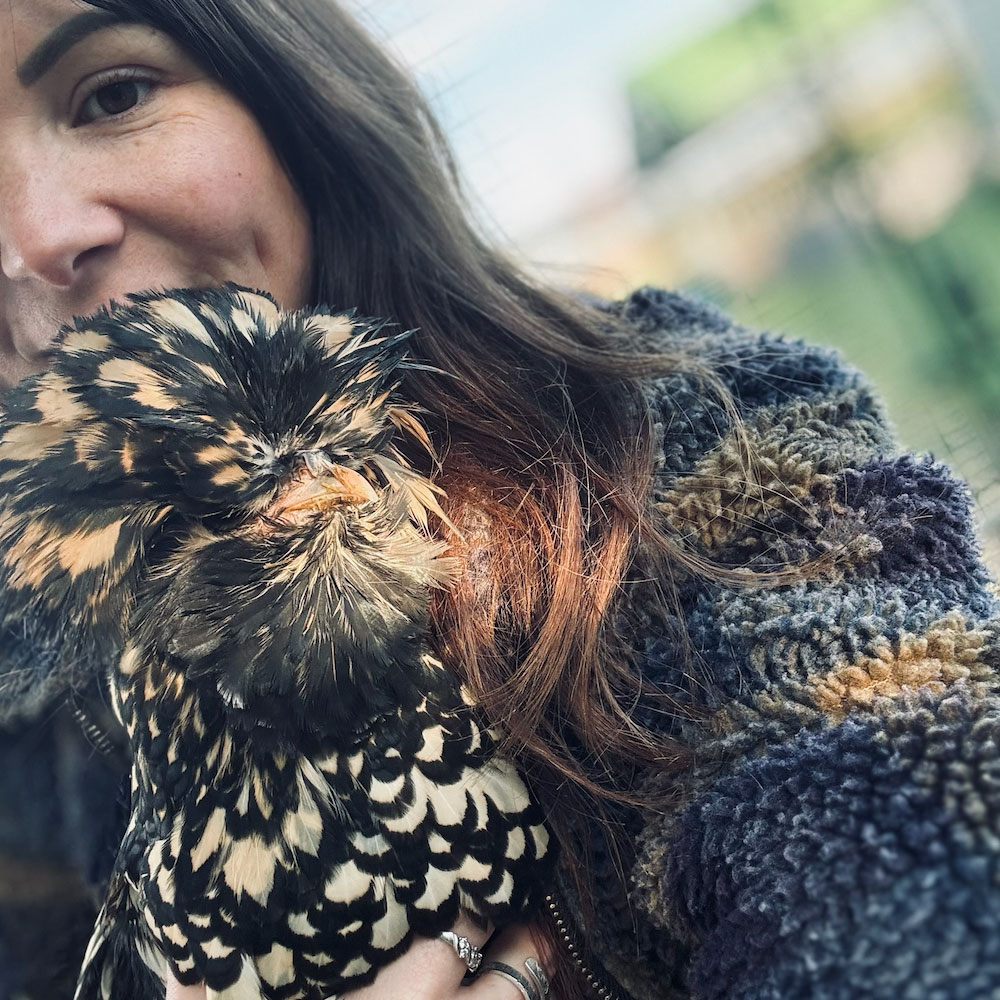
Silkie Chickens for Sale Online at Pipinchick
If you are considering adding Silkies to your flock, or just starting out on your chicken keeping journey, Pipinchick offers a wide range of Silkie varieties, raised with care and supported by years of poultry experience. You can explore Silkie chickens for sale, learn more about individual breeds and use the chicken buying guide to make confident, informed choices. Silkies offer warmth, personality and joy that few other breeds can match.
The Lohmann Brown is one of the most recognisable hybrid hens in the UK, known for a friendly nature, a steady appetite for exploring and one of the best laying chickens. They are a practical, friendly choice for anyone wanting reliable, fresh eggs and a calm presence in the garden. Although they are often recommended for first time keepers, Lohmann Browns also suit experienced keepers who simply want a no fuss layer with a gentle temperament. This guide explains what makes them so popular, the kind of care they thrive on and what UK homes can expect throughout their lifespan.
A Hen Designed for Steady Egg Production
The main reason many people choose Lohmann Browns is for their consistent egg laying performance. When kept in a good, healthy condition and supported with a balanced diet, they are capable of producing up to 300 eggs a year. The eggs are medium to large with a light brown shell and are laid most often through spring and summer when daylight hours peak. Their laying cycle often begins earlier in the year than some slower maturing breeds, which is why many new keepers see eggs soon after their hens settle in. As hybrid birds, they are bred for output as well as temperament, giving families and hobby keepers a dependable supply of fresh eggs throughout their most active months.
Temperament and Behaviour
Lohmann Browns have a sweet, steady nature, which is one of the reasons they make such good pets. They are sociable, confident and easy to handle once they are used to you. Although they enjoy human company, they are also happy to spend time pottering about without constant attention. They are not highly flighty birds, and once established in their home, they tend to explore calmly and settle well into a daily routine. Many families choose them for children, as they respond well to gentle interaction and quickly learn to follow people across the garden in hope of a treat. They are not aggressive birds, but because of their size and sturdy build, they are better suited to living with hybrids or other larger breeds rather than delicate bantams.
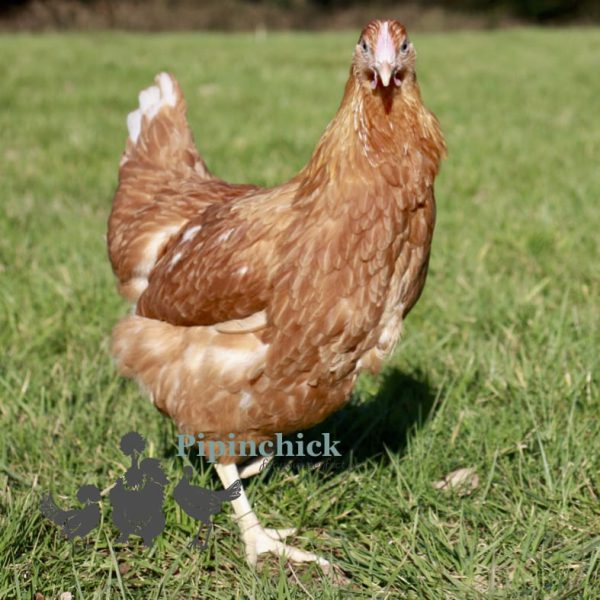
Housing and Space Needs
A little extra room is important for Lohmann Browns. They enjoy stretching their legs, roaming the garden and searching for insects. A secure run is essential for safety, but giving them time to free roam under supervision allows them to behave naturally and helps maintain their health. They are strong foragers and thrive when they are able to scratch about, dust bathe and explore new spaces. A dry, draught free coop with good ventilation is important, and roosting bars should be sturdy enough to support birds of their size. Fresh bedding, regular cleaning and plenty of enrichment will help them stay relaxed and productive throughout the year.
Lifespan and Long Term Care
Hybrid layers such as the Lohmann Brown tend to lay heavily in their earlier years. The first two years are usually their most productive, with egg numbers naturally reducing as they age. Many Lohmann Browns live between five and seven years when cared for well, with some reaching beyond this. Although their laying will slow down later in life, their personality remains just as charming, and many keepers continue to enjoy their calm presence even after egg production dips. Supporting older hens with good nutrition, clean housing and regular health checks helps them stay comfortable as they mature.
Feeding for Health and Productivity
Given their high laying potential, Lohmann Browns benefit from a balanced layer feed with the correct protein and calcium levels. Access to clean water at all times is essential, especially during warm spells when hydration supports both health and shell quality. Treats should be given in moderation so that the bulk of their diet remains nutrient rich. Many keepers offer additional enrichment such as lucerne blocks, fresh greens and mixed grit, which helps digestion and keeps them busy. A well fed Lohmann Brown is a happy and productive hen, and small routine adjustments can make a noticeable difference throughout the year.
Hardiness and Suitability for UK Weather
Lohmann Browns cope well with British seasons. They tolerate cold winters provided their coop stays dry and sheltered, and they remain active in warmer months as long as they have shade and access to water. Their calm nature means they are not easily stressed by changes in weather or environment, which contributes to their steady laying habits. Proper winter care, including dry bedding, good ventilation and clean perches, keeps them comfortable during colder spells. In summer, simple steps such as providing shaded areas and ensuring enough water helps them regulate their temperature during heatwaves.
Mixing Lohmann Browns with Other Breeds
This breed integrates well with similar sized birds. They do best in flocks where no one breed is outnumbered, as this keeps the group balanced and reduces competition. When pairing them with other hybrids or larger pure breeds like Orpingtons, Brahmas or Wyandottes, most keepers find they settle with little fuss. Introducing any new bird should always be done gradually and with supervision, but Lohmann Browns usually adapt quickly thanks to their sensible temperament.
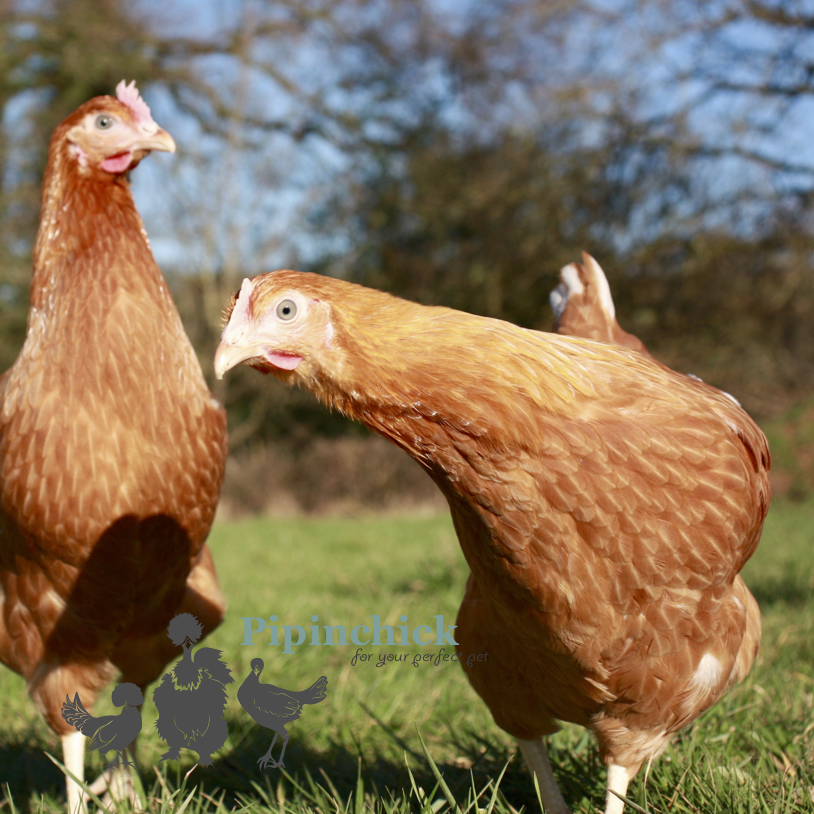
What UK Keepers Should Know Before Buying
Lohmann Browns are an excellent choice for keepers who want a gentle, productive and resilient hen. They do best with keepers who can offer a bit of space, a safe run, good feed and a consistent routine. They respond well to calm homes and reward their owners with a steady supply of eggs, an inquisitive personality and a lovely constant presence in the garden. Hybrid hens can vary slightly in egg shade or output, so small differences between birds are completely normal. If guaranteed egg colour is important, a pure breed may suit better, but for families who value dependable laying and an easy going temperament, the Lohmann Brown remains one of the best hybrid options available.
Lohmann Brown for Sale Online
If the Lohmann Brown sounds right for your garden or smallholding, you can explore the Hybrid Lohmann Brown chickens available at Pipinchick. Each hen is raised with care and supported in a calm environment before going to her new home. You can also browse compatible breeds and helpful products such as feeders, grit, multivitamins and coop essentials, making it easy to prepare for your new additions and support them throughout their laying journey.
Pipinchick are the UK’s number one most trusted pet poultry provider. We deliver happy, healthy chickens safely to your door. All our chickens are reared lovingly by us on our farm in the beautiful Chew Valley, just outside Bristol. We also sell lots of handy chicken keeping essentials such as plastic chicken houses, affordable wooden chicken coops, premium wooden chicken coops and runs, walk in chicken runs and enclosures as well as all the supplies you'll ever need to keep your hens happy and healthy, such as chicken corn & feed, chicken healthcare products and feeders and drinkers.
Blue eggs have become one of the most sought after features for modern chicken keepers. They look beautiful in the kitchen, make a lovely talking point when friends or family visit, and offer something special that standard brown or white eggs simply cannot match. Blue egg layers are also known for friendly temperaments, interesting colours and unique personalities, which means they often become favourites among garden keepers. If you are choosing your first coloured egg layer or adding to an existing flock, this guide explains why some chickens lay blue eggs, which breeds at Pipinchick produce them, and how to decide which one suits your home and lifestyle.
Why Do Some Chickens Lay Blue Eggs?
Blue eggs come from a naturally occurring pigment called oocyanin, a by-product of bile that tints the shell as it forms. Unlike brown egg pigment, which sits on the surface, the blue pigment permeates the entire shell. This means the inside of a blue egg is blue as well, whereas brown eggs are white inside once you look past the surface staining. Although blue eggs may look unusual, they are nutritionally identical to eggs of any other colour. The pigment does not affect flavour, texture or cooking quality. The main difference is the visual appeal and the way coloured eggs make the egg basket look just that little bit more special.
How Egg Colour Varies Between Blue-Egg Breeds
Not all blue eggs look the same. Some are a soft powder blue, others have a clearer sky blue finish, and some lean towards a greenish tint depending on the genetics of the parent birds. In hybrid birds, combining a blue laying gene with a brown laying gene can produce olive tones, sage greens or blue-green blends. Factors such as light, diet, stress and age can affect the depth of colour, although the underlying shade comes from genetics. Pure blue layers such as Ameraucanas and Rumpless Araucanas tend to produce the clearest and most consistent blue shades, while crossbred options like the Hybrid Olive Egger offer a naturally wider spectrum.
Blue Egg Laying Breeds Available At Pipinchick
Pipinchick is one of the UK’s leading suppliers of coloured egg layers, offering several pure and hybrid breeds that reliably produce blue or blue tinted eggs. Below is a closer look at each of the blue egg layers you can buy from the Pipinchick flock.
Ameraucana
Ameraucanas are one of the most reliable pure blue-egg producers available. They are known for producing a clear, even shade of blue that stays consistent throughout the laying season. Ameraucanas are friendly, curious and good for gardens of most sizes. They prefer a calm environment and get along well with other gentle breeds. Their egg production varies but often sits at a steady level through the spring and summer months. They handle UK weather well and are a good choice for both beginners and experienced keepers who want a dependable coloured egg producer.
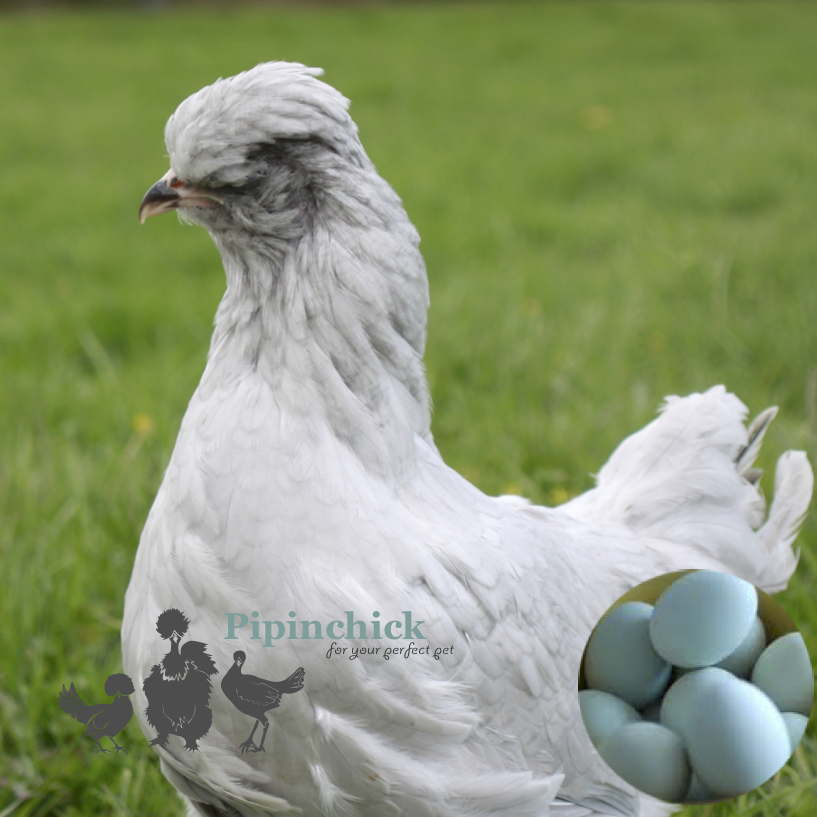
Rumpless Araucana
The Rumpless Araucana is one of the original blue egg laying breeds. They have distinctive ear tufts and no tail, which gives them a striking appearance. Araucanas lay some of the bluest eggs of any breed and are often chosen by keepers who want eggs with a strong sky-blue tone. They are active birds that enjoy space to explore but can still adapt well to medium sized gardens when they have enrichment and places to forage. Their friendly nature and unusual appearance make them a popular choice for those wanting something a little different from their flock.
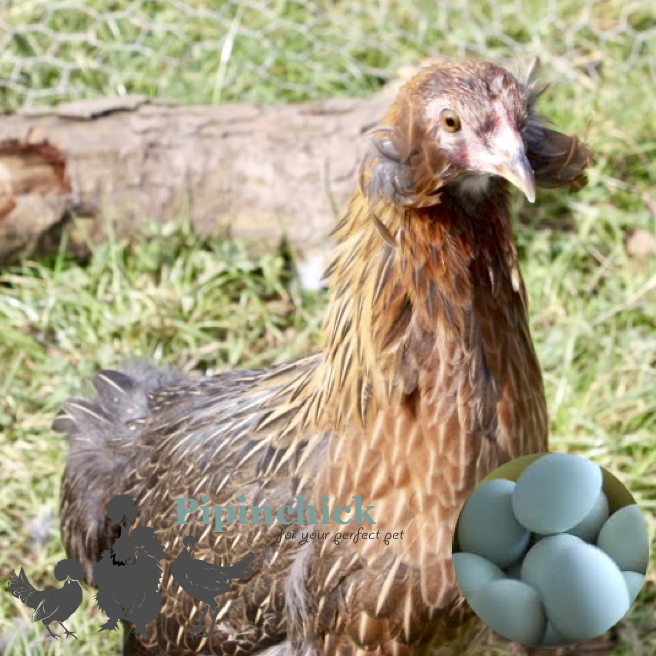
Legbar
The Legbar is a well established blue egg layer in the UK. Their eggs are usually a soft pastel blue. Legbars are alert, confident and excellent foragers, making them ideal for free range environments or gardens that allow the flock to explore safely. They are hardy birds that lay well through most of the year and tend to settle into groups easily. For anyone wanting a reliable blue egg layer with a calm and steady personality, Legbars are an excellent choice.
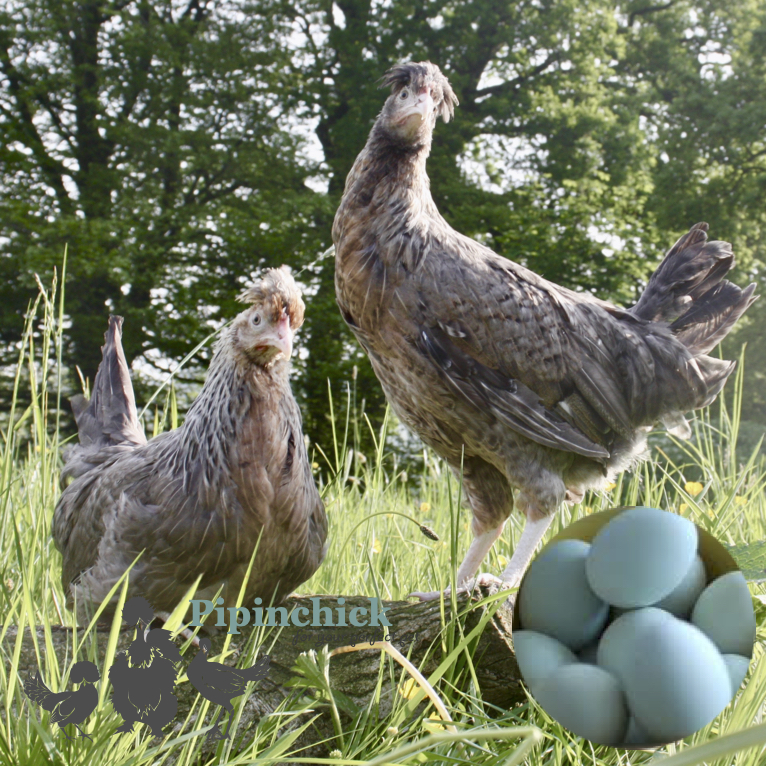
Hybrid Legbar
The Hybrid Legbar offers the classic blue egg gene combined with the practicality and consistency of hybrid breeding. This means dependable laying patterns, good year round resilience and a pleasant temperament suited to family gardens. The shade of the eggs is usually blue or a soft blue green depending on the individual bird. Hybrid Legbars are particularly popular with keepers who want coloured eggs with reliable output, especially during the busier months of the year when consistent laying can be helpful.
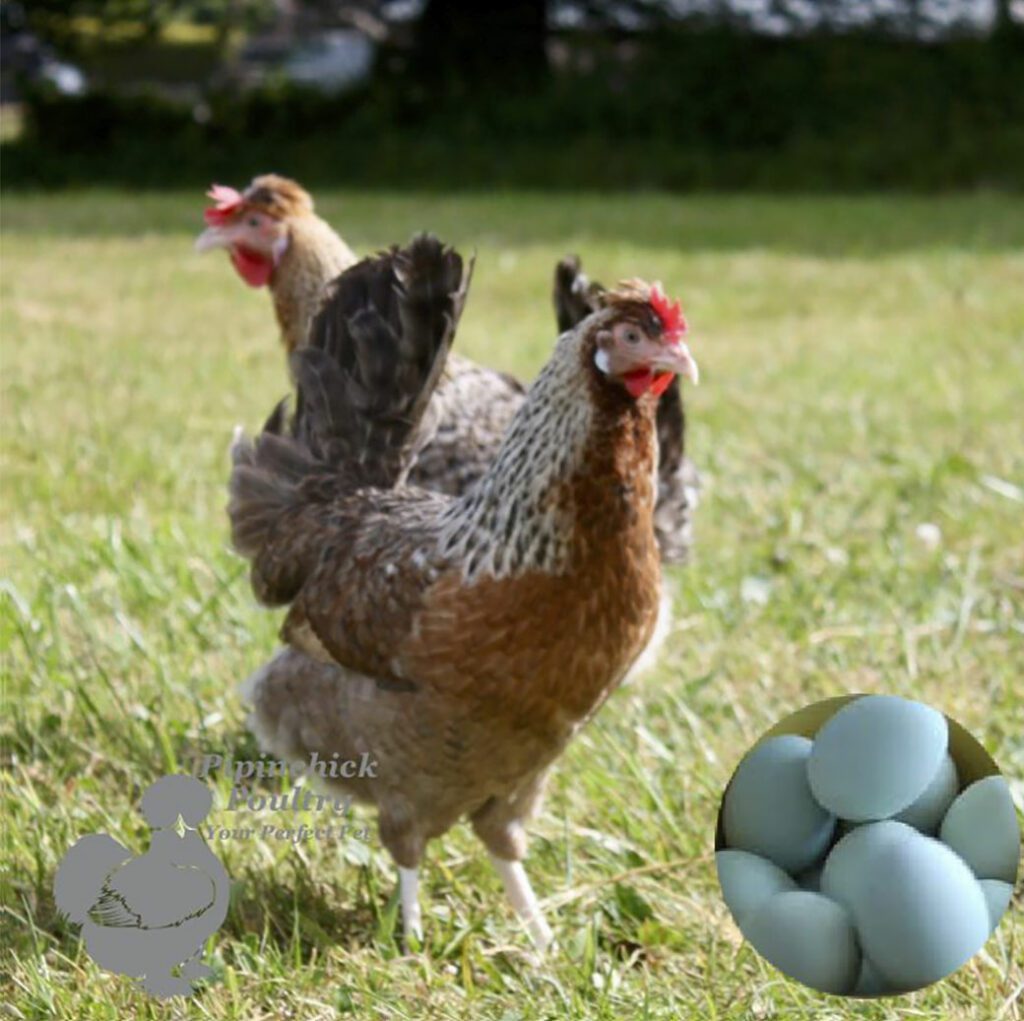
Hybrid Olive Egger
Although Olive Eggers are usually associated with olive coloured shells, many of them produce blue green eggs with a soft tint, especially in the first year. Because an Olive Egger carries a blue egg gene, the pigment can lean towards blue or sage depending on the parentage. At Pipinchick, the Hybrid Olive Egger remains a favourite among those who enjoy a mixed basket of colours. They are excellent layers, friendly birds and versatile additions to gardens of all sizes. If you like the idea of blue eggs but also want the possibility of green tones, this hybrid offers the best of both worlds.
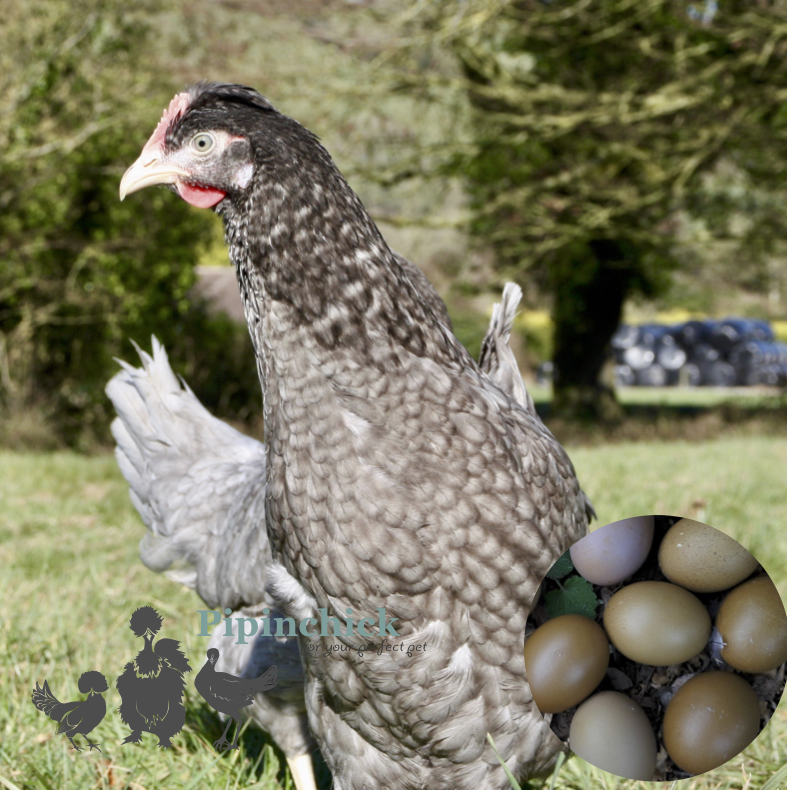
How Many Blue Eggs To Expect
Pure breeds such as Ameraucanas and Araucanas lay moderate but steady numbers of blue eggs, while hybrids like the Hybrid Legbar and Hybrid Olive Egger may produce a higher quantity throughout the year. Age, diet, day length and overall health all influence laying performance, so providing good quality feed, fresh water, space, enrichment and a dry secure coop will help your birds lay to their full potential.
Choosing The Right Blue Egg Chicken For Your Garden
If you want strong, clear blue eggs, the best choices are Ameraucana, Rumpless Araucana and Legbar. If you want dependable laying with a calm temperament, Hybrid Legbars and Devon Blues are excellent. For keepers who want variety in the egg basket, the Hybrid Olive Egger is ideal. All the blue egg breeds at Pipinchick can live happily together and with other gentle breeds, making them easy to integrate into existing flocks.
Buying Blue Egg Hens Online
If you are keen to add blue eggs to your daily egg basket, you can explore blue egg laying breeds in the Pipinchick collection of chickens to buy online. The Ameraucana, Rumpless Araucana, Legbar, Hybrid Legbar, Devon Blue and Hybrid Olive Egger are available to buy through the Pipinchick website. Each product page includes details on temperament, laying patterns, care needs and compatibility, helping you choose the right coloured egg layer for your home or smallholding.
Pipinchick are the UK’s number one most trusted pet poultry provider. We deliver happy, healthy chickens safely to your door. All our chickens are reared lovingly by us on our farm in the beautiful Chew Valley, just outside Bristol. We also sell lots of handy chicken keeping essentials such as plastic chicken houses, wooden chicken coops, chicken runs and enclosures as well as all the supplies you'll ever need to keep your hens happy and healthy, such as chicken corn & feed, chicken healthcare products and feeders and drinkers.
If you’ve been keeping chickens for a while, you’ll know that the occasional cough, sneeze or sniffle can happen, especially when the seasons change or your flock is under stress. But if you start hearing persistent rattly breathing, wheezing or see bubbly eyes, it could be something more serious, possibly Mycoplasma. Don’t panic though. It’s a common respiratory infection in poultry, and with early treatment, your hens can recover well and get back to their usual happy scratching and clucking in no time.
What Is Mycoplasma?
Mycoplasma is a bacterial infection that affects a chicken’s respiratory system. There are two main types that tend to crop up in backyard flocks, Mycoplasma gallisepticum and Mycoplasma synoviae. Both can cause breathing problems, but each has its own tell-tale signs.
- Mycoplasma gallisepticum often leads to swollen eyelids, watery or bubbly eyes, and that distinctive wheezy breathing sound you might hear most clearly at night when your hens are relaxed.
- Mycoplasma synoviae can also cause thick yellow pus in the eyes and sinuses, along with swollen joints or thin-shelled eggs.
Because symptoms overlap with other respiratory issues such as infectious bronchitis or colds, it’s always wise to get a professional diagnosis from your vet before starting any treatment.
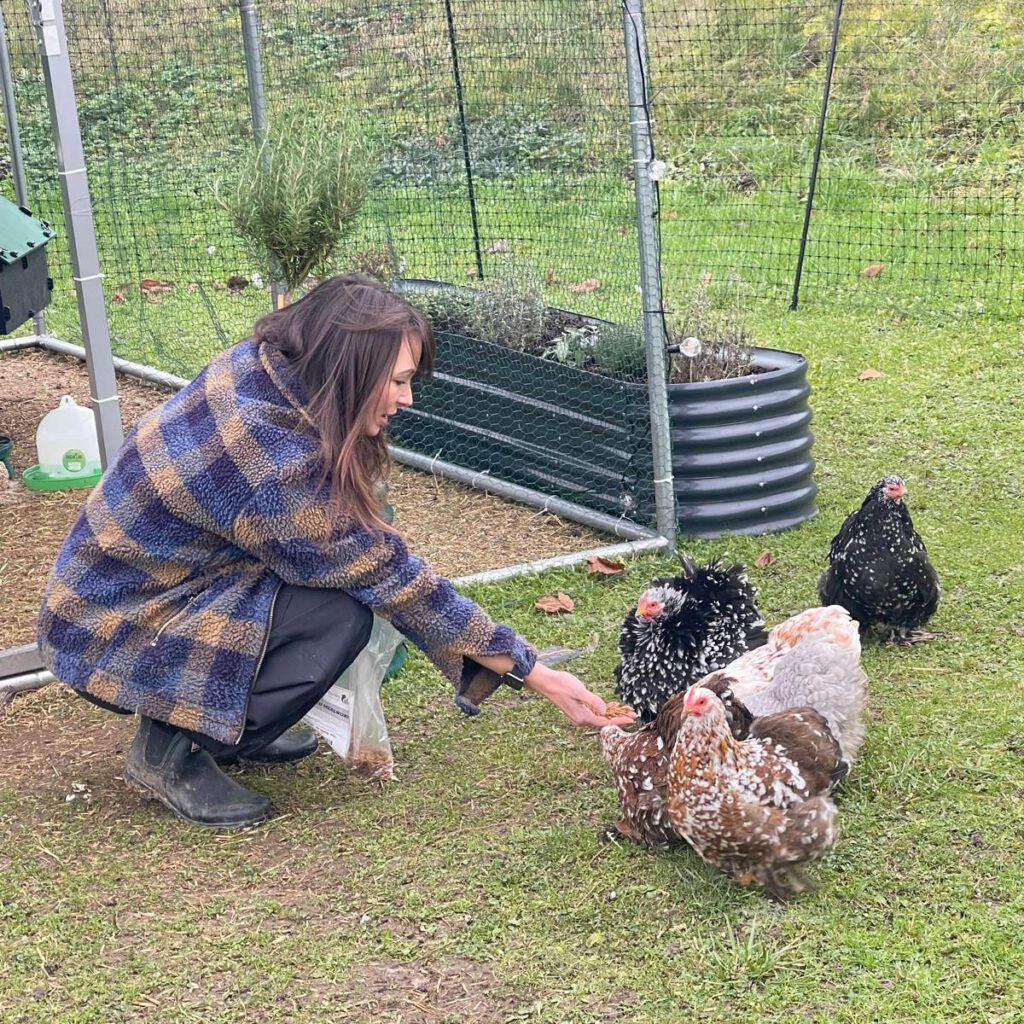
How Do Chickens Catch Mycoplasma?
Unfortunately, Mycoplasma spreads easily through close contact, shared feed or water, and even through the air in enclosed spaces. It can also be passed from hen to chick through the egg. Stress, poor ventilation, overcrowding or damp conditions can all make a flock more vulnerable.
If one bird is infected, it’s likely that others have already been exposed — even if they don’t show symptoms right away. Some hens can carry the bacteria without showing signs until they’re stressed, moulting, or going through a sudden change such as a move or introduction of new birds.
Common Symptoms to Watch Out For
- Sneezing, wheezing or coughing
- Swollen eyes or sinuses
- Bubbly or foamy discharge from the eyes
- Lethargy or reduced appetite
- Drop in egg production
- Thin shells or misshapen eggs
- Gasping at night when the coop is quiet
If you notice several of these symptoms, it’s best to act quickly. Early treatment gives the best chance of full recovery and helps stop the infection spreading through your flock.
Treating Mycoplasma in Chickens
If caught early enough, Mycoplasma infections respond well to antibiotics. The most common and effective treatment is Tylan, which you’ll need to get via a veterinary prescription. It’s usually added to drinking water or administered directly by syringe, depending on your vet’s advice.
Once treatment begins, most hens start to perk up within a few days, though it’s important to complete the full course to prevent recurrence or resistance.
Even with antibiotics, recovery can take time, and some birds may remain carriers for life. That means they can seem perfectly healthy but still spread the bacteria to others. For this reason, good biosecurity and supportive care are just as important as the medication itself.
Supporting Recovery with Natural Tonics
Alongside veterinary treatment, a good poultry tonic can make a big difference to recovery. Products such as Agrivite Poultry Respite Tonic are designed to support hens during and after respiratory illness. Respite is a natural, herbal tonic that helps soothe respiratory distress, relieve coughing, and strengthen the immune system.
Adding it to drinking water for a few days (or as directed on the bottle) can help your hens bounce back faster and regain their energy. It’s especially useful after a bout of Mycoplasma or when your flock seems run down during cold or damp weather.
How to Give Medicine or Tonic to Chickens
Administering medicine to chickens can feel daunting, but there are a few easy methods that make it far less stressful for both you and your birds.
- In Drinking Water
Many antibiotics and tonics can be diluted into the flock’s water supply. Always remove other water sources so all hens drink from the treated supply. Keep it fresh daily, and follow dosage instructions carefully. - By Syringe or Dropper
For individual treatment, use a small syringe or dropper to gently give medication straight into the beak. Hold the hen firmly but gently, keeping her calm and upright to avoid aspiration. A towel around the body can help if you’re working alone. - On Food or Treats
If your hens are fussy drinkers, you can sometimes disguise medicines by mixing them with a small amount of soft food such as scrambled egg or a favourite mash. Just make sure each hen gets her full dose. - Aftercare
Once your hens are medicated, keep them warm, dry, and stress-free. Clean out the coop thoroughly to remove any lingering bacteria, and avoid introducing new birds until your flock is fully recovered.
Can Mycoplasma Be Prevented?
While you can’t always stop bacteria finding their way in, good flock management goes a long way toward prevention.
- Keep coops clean and well-ventilated
- Avoid overcrowding
- Quarantine new birds for at least two weeks
- Use disinfectant regularly on feeders, drinkers and perches
- Provide a balanced diet and vitamin supplements to boost immunity
A healthy, happy flock is naturally more resilient to infection.
When to Call the Vet
If symptoms persist after tonic use, or if your hens appear to struggle with breathing, lose condition, or stop eating altogether, contact your vet right away. They can confirm the diagnosis and prescribe the right antibiotic or treatment plan.
Does my Chicken have Mycoplasma?
Mycoplasma can sound worrying, but it’s one of those conditions many chicken keepers will encounter at some point. The key is early recognition, prompt treatment, and plenty of supportive care. Keep an eye out for sneezing or bubbling eyes, act quickly if you suspect infection, and always have a bottle of something like Agrivite Poultry Respite Tonic on hand for those times when your flock needs a little extra help. With good management and a watchful eye, your hens will be back to their cheerful, egg-laying selves before you know it.
You can also check our chicken health checker to help diagnose whether your chicken is suffering from Mycoplasma, or use our "call me asap" help service - for only £12 you can book a video call with our chief chicken whisperer, where we can help diagnose any ailments your chicken may have. Pipinchick stocks a wide range of chicken healthcare products to support your chickens' health and well-being. We are one of the UK's most trusted suppliers of live chickens delivered safely to your door, after being reared with love at our farm in the beautiful Somerset countryside near Bristol.
As the days grow shorter and the chill creeps in, it’s time to think about how to keep your flock comfortable through the colder months. Chickens are far hardier than many people realise, but even the fluffiest hens need a bit of extra care when temperatures drop. With the right setup, feeding routine, and housing, your hens will stay snug, healthy, and happily laying all winter long.

Do Chickens Feel the Cold?
Yes, but not in the same way we do. Chickens are naturally equipped with feathers that trap body heat, and they can fluff themselves up to create their own cosy insulation. Most breeds cope well with typical British winters, even when the frost sets in. What they don’t like, however, is dampness or draughts. Moisture and wind chill are the biggest culprits for illness in winter flocks, far more so than the temperature itself.
Preparing a Chicken Coop for Winter
Start by giving your coop a thorough clean before the cold weather arrives. Remove all old bedding, disinfect surfaces, and check for any leaks or cracks. A dry, draught-free coop is the foundation of good winter care.
When it comes to insulation, you don’t need anything fancy. A layer of fresh straw or wood shavings works brilliantly. It keeps the floor dry, absorbs moisture, and gives your hens a soft, warm place to roost. In very cold spells, adding an extra layer of bedding or using the deep litter method can help create natural warmth from the composting process beneath.
Avoid blocking ventilation completely. Good airflow prevents condensation, which can lead to damp bedding and respiratory problems. The trick is to allow air to circulate above the chickens’ heads while keeping out direct draughts at perch level.

Perches and Positioning
Chickens like to huddle together at night, which helps them share body heat. Make sure your perches are wide enough for them to sit comfortably and cover their feet with their feathers. This helps prevent frostbite on cold nights. Round or narrow perches can leave toes exposed, so a flat wooden perch about 5cm wide is ideal.
If your coop is small or sits directly on the ground, raising it slightly can reduce heat loss and prevent damp rising from the soil.
Feeding for Warmth and Health
A little extra feed can go a long way during the colder months. Chickens burn more calories in winter to maintain body heat, so increasing their rations slightly helps keep them healthy and warm. Offer their usual layers pellets alongside high-energy treats such as mixed corn, which is best given in the late afternoon. As they digest it overnight, it provides a slow release of warmth from the inside.
Access to clean, unfrozen water is also essential. Check poultry drinkers at least twice a day and consider using an insulated or heated base if you live in an area prone to freezing temperatures.
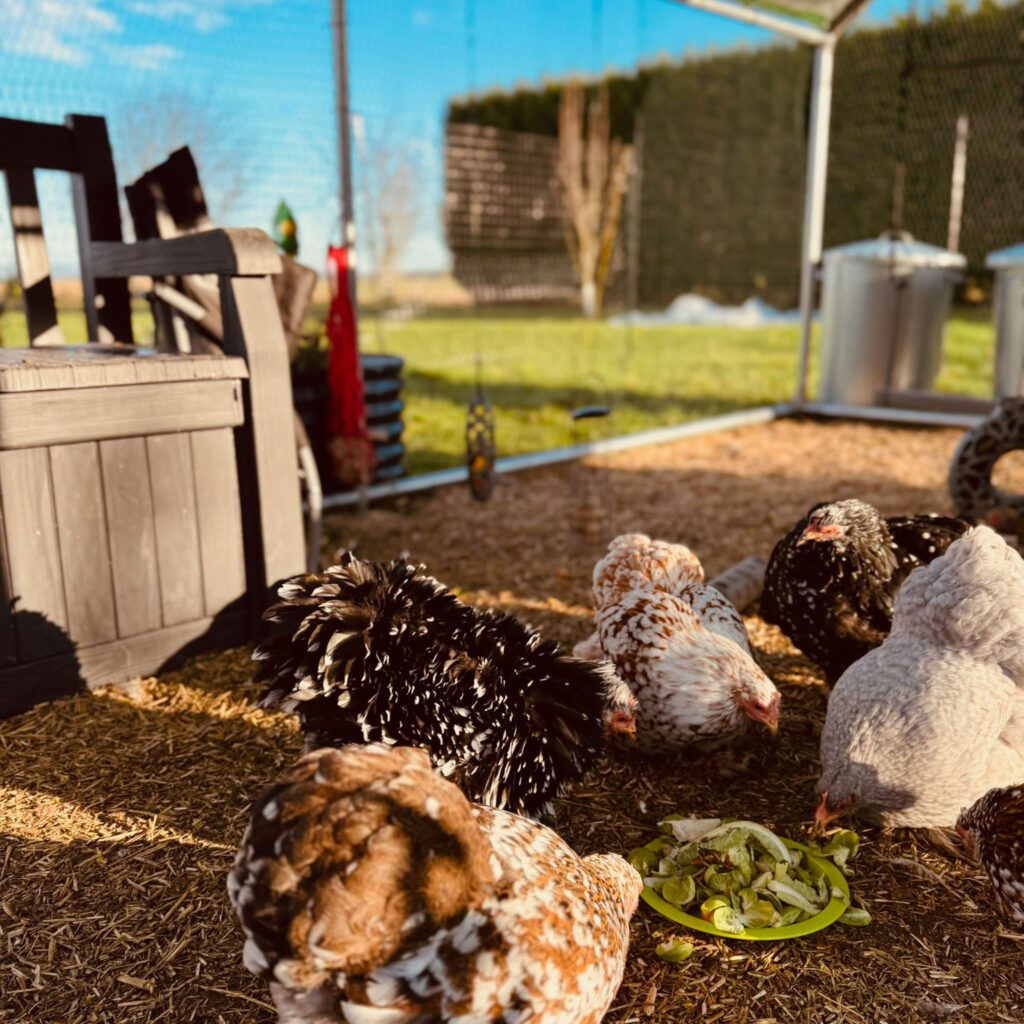
Watch for Winter Health Issues
Colds and respiratory infections like Mycoplasma are more likely to crop up when the air is damp or coops are poorly ventilated. Keep a close eye on your flock for any sneezing, rattly breathing, or watery eyes. If you do notice signs of illness, separate the affected bird, keep her warm and dry, and seek veterinary advice quickly. Products such as Agrivite Poultry Respite Tonic can help support recovery and soothe respiratory distress after infection.
Also keep an eye on combs and wattles in very cold weather. In exposed areas, frostbite can occur, especially in breeds with larger combs. A thin layer of Vaseline or coconut oil applied gently can help provide protection.
Should You Use a Heat Lamp?
It’s tempting to plug in a heater when temperatures drop, but in most cases, it’s unnecessary and even risky. Sudden changes in temperature can make birds more vulnerable to illness, and electrical equipment in coops carries a fire hazard. Healthy hens with good shelter and plenty of bedding do not usually need artificial heat. If you do use one, make sure it’s securely fitted, moisture-proof, and regulated so the coop doesn’t become too warm.
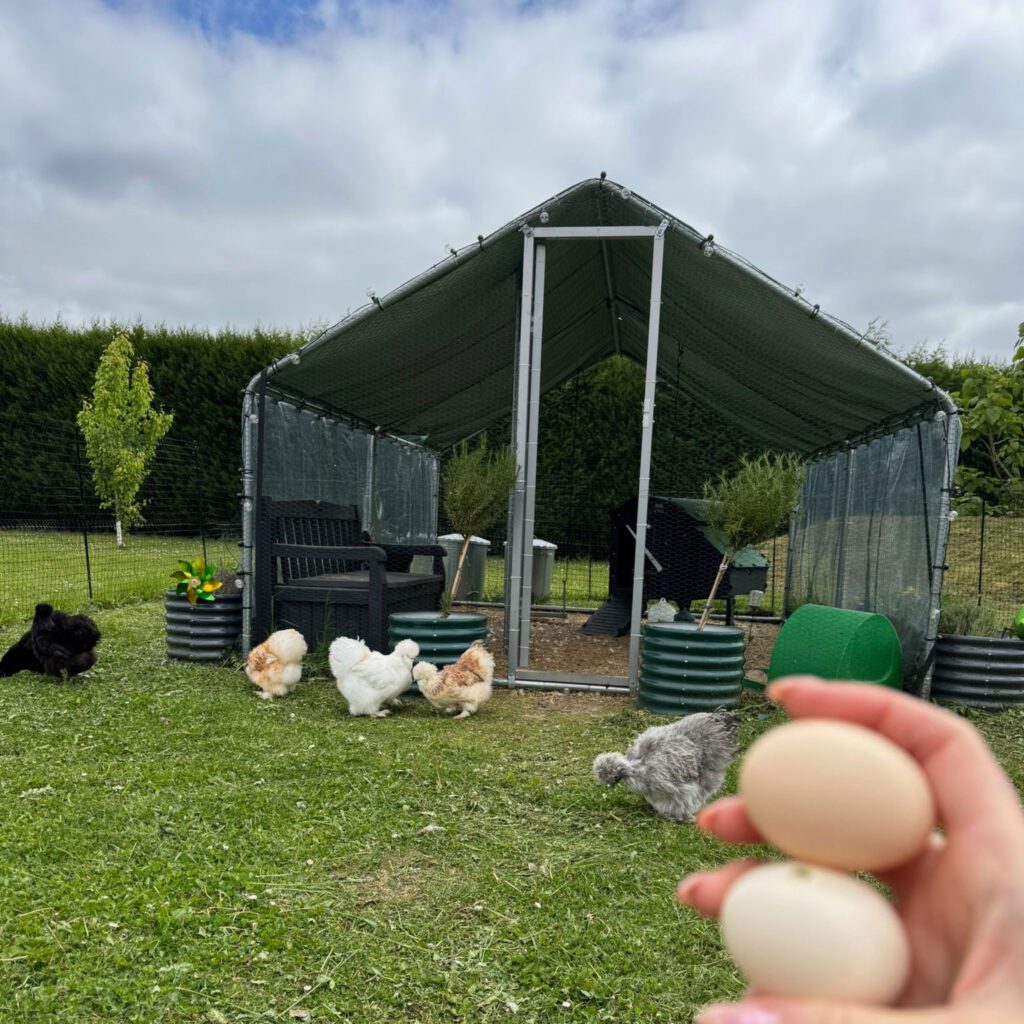
Encouraging Activity During Cold Days
Chickens still enjoy scratching about and foraging in winter, even if they spend more time inside. Scatter a little mixed corn or grain in their run to encourage movement, which helps keep them warm. Hanging leafy greens or treat blocks can also prevent boredom when the ground is frozen.
If your run gets muddy, add straw or bark chippings to keep their feet dry. Wet, cold feet can quickly lead to discomfort and frostbite.
Boosting Immunity and Condition
Winter is the perfect time to add supplements and tonics to your hens’ routine. A product like Agrivite Poultry Respite Tonic can help support the immune system during times of stress, cold, or recovery from respiratory illness. A splash in their drinking water for a few days helps boost their condition and keeps them resilient. Apple cider vinegar (unpasteurised) and porridge such as Forager Winter Warmer Garlic & Herb can also be used occasionally to support gut and respiratory health.
Handling and Care Tips
Try not to handle your chickens too much in cold weather, especially at night when they’re roosting. Their feathers trap warm air, and picking them up can release it. If you do need to examine a hen, do it quickly and gently, then let her settle back in with the flock.
Make daily checks part of your routine. Look for signs of damp, mould, or droppings build-up in the coop, and keep bedding topped up. Small daily jobs make winter chicken keeping much easier and keep your flock thriving right through to spring.

Keeping Your Hens Warm and Well with Pipinchick
Winter doesn’t have to be a worrying time for chicken keepers. With a snug, draught-free chicken coop, a good quality diet, and a few simple care routines, your flock will stay comfortable right through the colder months. The key to warmth is proper care rather than gadgets. A clean, dry environment and a balanced diet do far more to keep your hens happy and healthy than any heater ever could.
Make sure your birds have plenty of nutritious chicken feed to help them maintain energy and condition. If you need to restock before the cold sets in, take a look at our full range of chicken feed and treats to keep their tummies full and feathers glossy. For anyone thinking their coop could use an upgrade, our chicken houses and runs are designed to offer both warmth and ventilation, making them perfect for year-round comfort.
And if your flock needs a little extra support through the winter, our carefully selected chicken healthcare products include tonics, vitamins, supplements and natural remedies to keep your hens in top form.
With the right setup and a touch of daily care, your hens will stay cosy, content, and clucking their way through winter with ease.
Pipinchick are the UK’s number one most trusted pet poultry provider. We deliver happy, healthy chickens safely to your door. All our chickens are reared lovingly by us on our farm in the beautiful Chew Valley, just outside Bristol. Our breeds include Silkies, Bantams, and pure breed chickens as well as a whole range of high quality chicken keeping supplies.
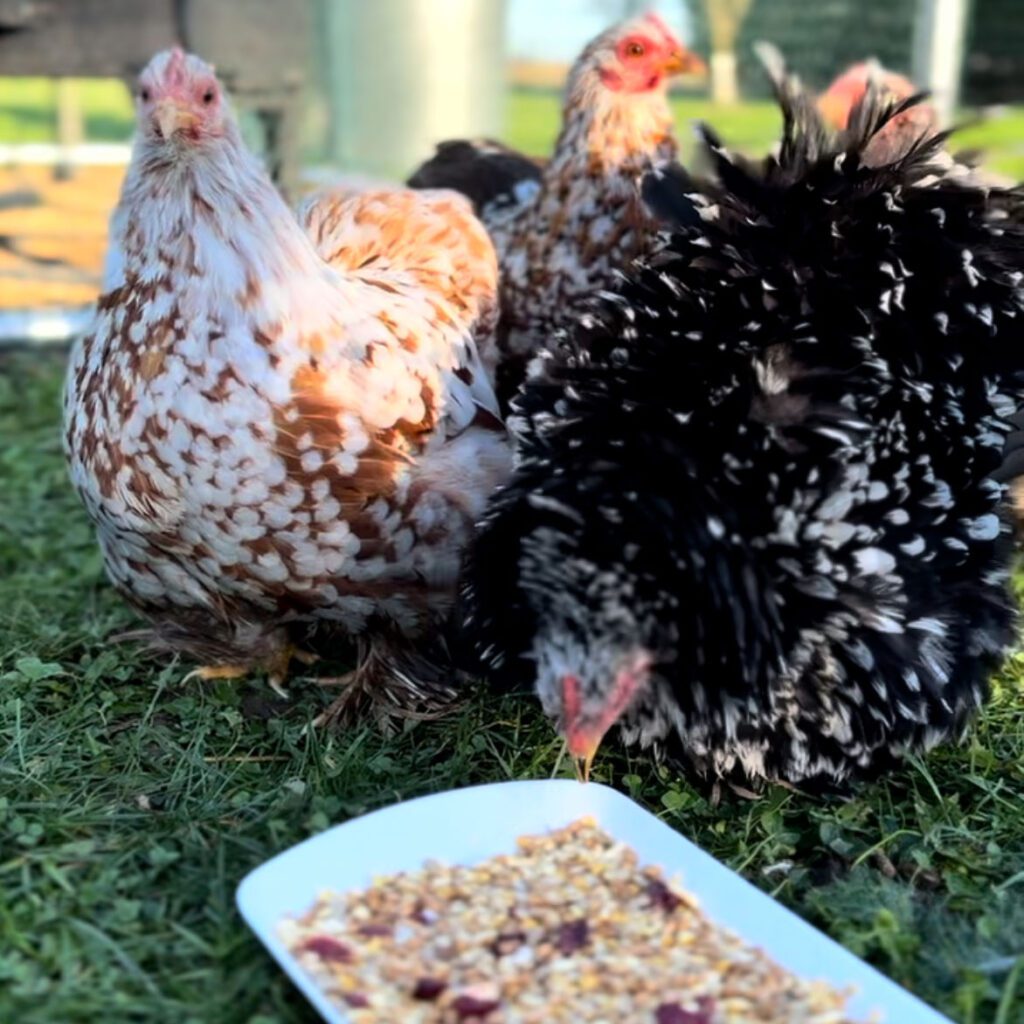
If you’re bringing new hens into your garden, you'll need to know whether they’ve been vaccinated. At Pipinchick, we vaccinate all our chickens for Salmonella, Marek’s, Newcastle’s Disease and Infectious Bronchitis. These are some of the most serious threats to poultry health, and protecting against them gives your flock the best chance of a long, happy life.
We don’t believe in over-vaccinating, as this can actually lead to weaker birds. Sadly, farms that use excessive vaccines often do so after years of recurring problems. Instead, our approach is balanced and focused, protecting against the most dangerous and common illnesses without compromising the pet birds' own natural strength.
Why Vaccinating Chickens Is Important
Buying unvaccinated chickens can be risky. Marek’s disease, for example, has no cure and is highly contagious. Once it takes hold, it can sweep through a flock quickly with devastating results. Vaccination is the only reliable way to protect against it. The same goes for other serious diseases like Newcastle’s and Infectious Bronchitis. These are not illnesses you want anywhere near your coop.
Common Chicken Illnesses to Know About
Even with vaccinated birds, it’s worth being aware of the most common illnesses that chickens can suffer from. Some are preventable with vaccines, while others need careful management, a clean environment and early treatment.
- Mycoplasma – a bacterial infection that affects the respiratory system. It’s often treatable with antibiotics like Tylan if caught early.
- Worms and Parasites – regular worming and parasite control is essential to prevent infestations that can weaken your birds.
- Marek’s Disease – a fatal viral infection that is highly contagious. Vaccination is the only protection, and it’s one of the reasons we vaccinate every bird.
- Bumblefoot – a bacterial infection in the foot that can cause swelling, lameness and even blood poisoning if untreated.
- Internal Infections – can develop for many reasons, often leading to lethargy, loss of appetite and unusual droppings. Veterinary treatment is usually needed.
- Egg Peritonitis and Egg Binding – problems with egg laying that can quickly turn serious, sometimes causing internal infections.
- Sour or Impacted Crop – when food becomes stuck in the crop, leading to infection or starvation if not addressed.
- Vent Prolapse – a serious condition where part of the vent tissue protrudes. It can sometimes be corrected, but often results in reoccurrence.
- Coccidiosis – a parasitic infection usually affecting young birds, caused by dirty environments or contaminated droppings.
- Avian Influenza – one of the most significant poultry diseases worldwide. It’s highly contagious and fatal, with no available vaccine for backyard poultry.
Should I Buy Vaccinated Chickens?
In short, yes. Vaccination protects your flock from diseases that you simply cannot manage with good husbandry alone. While you can keep on top of parasites, infections and crop issues with attentive care, you can’t control viral killers like Marek’s or Newcastle’s without vaccines. By choosing vaccinated birds, you give your flock a strong start and reduce the risk of heartbreaking losses.
Looking After Your Flock
Vaccines are just one part of keeping hens happy and healthy. A clean coop, good quality feed, plenty of fresh water and space to roam will all help your birds thrive. Staying alert to signs of illness and acting quickly if something looks wrong makes a big difference too.
At Pipinchick, we’re proud to offer vaccinated chickens that are raised with care, giving you peace of mind when you welcome new birds into your home.
Find Your Perfect Flock with Pipinchick
Vaccinating chickens is just one part of building a healthy and happy flock, and at Pipinchick we make it simple to start your chicken-keeping journey with confidence. All of our hens are carefully raised, fully vaccinated against the most serious diseases, and ready to settle into their new homes. We specialise in friendly breeds such as Silkies, Bantams, and Hybrids, chosen for their temperaments as much as their looks, so you can enjoy both wonderful companions and reliable layers.
As well as our chickens for sale, we also stock everything you need to keep them thriving, from coops and runs to feeders, treats, and health supplies. Whether you’re brand new to keeping hens or adding to your existing flock, Pipinchick is here with expert advice, quality products, and healthy, vaccinated birds you can trust.
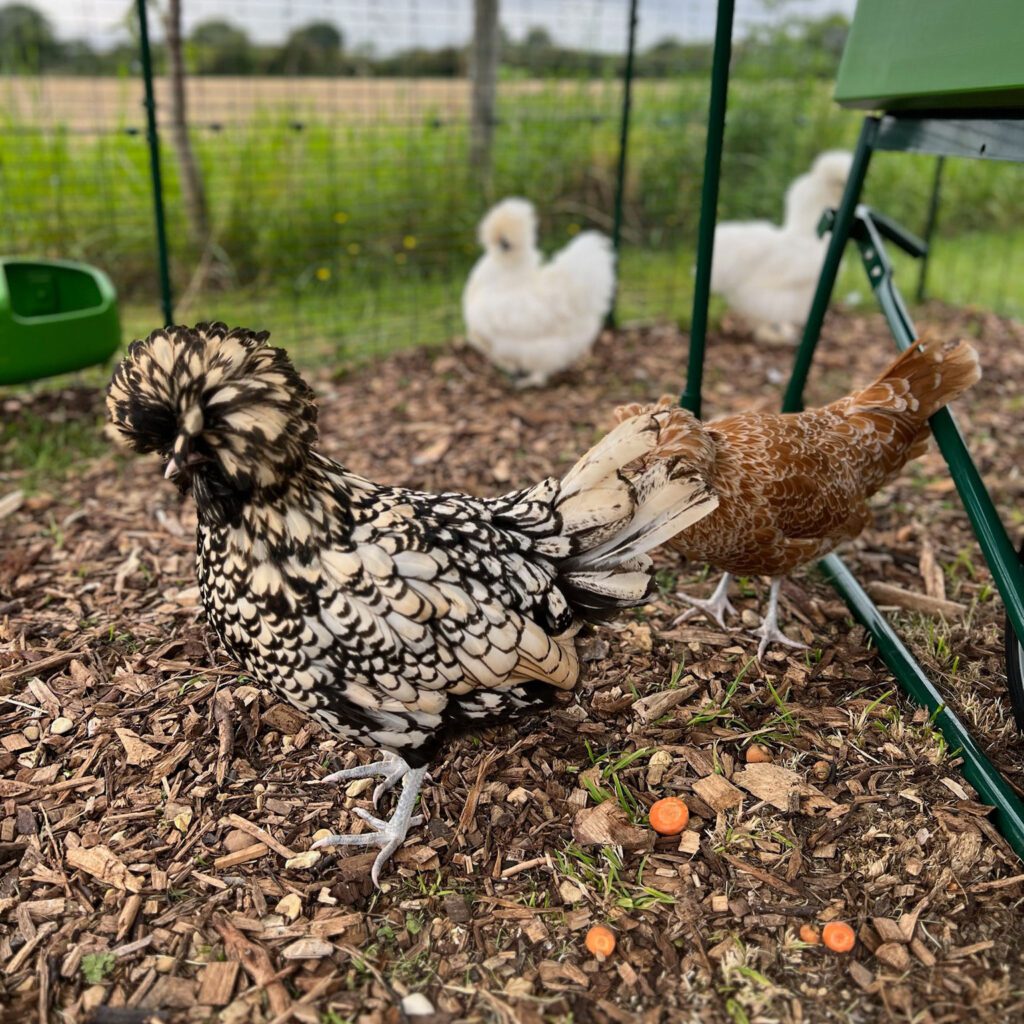
One of the (many!) joys of keeping pet chickens is watching them scratch, peck and cluck their way through a good meal. But what you feed your hens makes a huge difference to their health, egg production and overall happiness. With so much advice out there, it can be hard to know what’s truly safe, what’s essential, and what should be avoided. This guide takes you through everything from safe treats to complete feeds, so you can be confident your hens are getting the diet they need.
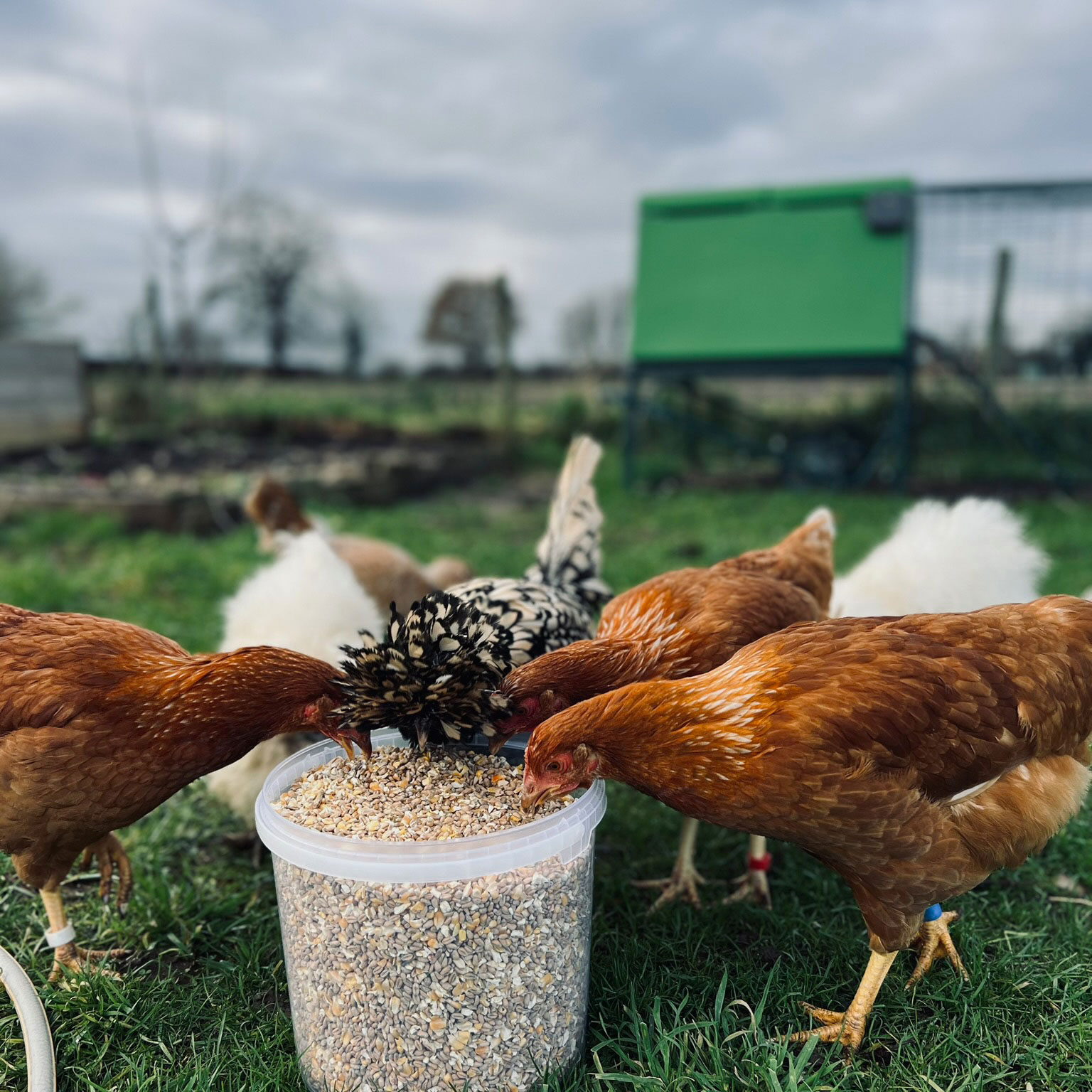
What Are Safe Foods for Chickens?
Chickens enjoy a wide variety of foods, and many are perfectly safe in moderation. These can be offered alongside their main feed to provide variety and enrichment.
- Fruits and vegetables – almost all are safe, except the dangerous ones listed in our guide to foods you should never feed your hens. Apples, berries, greens and carrots are all popular choices.
- Dried corn – a great source of energy, especially in colder months.
- Live grubs – mealworms, soldier fly larvae and calci worms are not only nutritious but also encourage natural foraging behaviour.
- Seeds – pumpkin, sunflower and sesame seeds are good options.
- Nuts – safe in small amounts, but high in fat, so offer sparingly.
- Dried woodland mushrooms – only if they are safe for human consumption.
- Edible flowers – marigolds, nasturtiums, lavender and roses add colour and interest to their diet.
- Herbs – parsley, oregano, thyme, lemon balm and rosemary are great for health and wellbeing.
- Rolled oats – best given as porridge in winter to help hens stay warm overnight.
It is important to note that it is illegal in the UK to feed chickens meat, kitchen scraps or dried grubs. Always check your treats are safe and suitable before offering them.
What Should I Feed Chickens at Different Ages?
Chickens have different nutritional needs as they grow, and the right feed at the right stage will help them develop properly.
- Chick crumb – from day-old chicks up to around six weeks, they need a fine crumb packed with protein to support rapid growth.
- Grower or rearer pellets – from six weeks until around 14–20 weeks (depending on breed), this feed helps young birds build strength without being too rich.
- Layers pellets or mash – from 14–20 weeks onwards, your hens should move to a complete layer feed. This should make up 80–90% of their diet, as it contains the correct balance of protein, vitamins and minerals to support egg laying.
While it can be tempting to spoil your flock with corn, wheat or barley, these should never be given as their main feed. Without a complete pellet or mash, your hens will miss out on essential nutrients. Treats should always be kept in moderation to make sure they keep eating their pellets.
How Often Should I Feed Chickens?
Unlike dogs and cats, chickens don’t eat in one sitting. They prefer to graze throughout the day, much like cows. This means you should always keep a good-quality feed available to them. Using a hanging feeder or a treadle feeder is the best way to keep food clean and reduce waste, while also helping deter rats. If rodents are a problem, you can also take feeders in at night once your hens are asleep.
Alongside their feed, fresh water should always be available. Chickens drink little and often, and dehydration can quickly affect egg production and health.
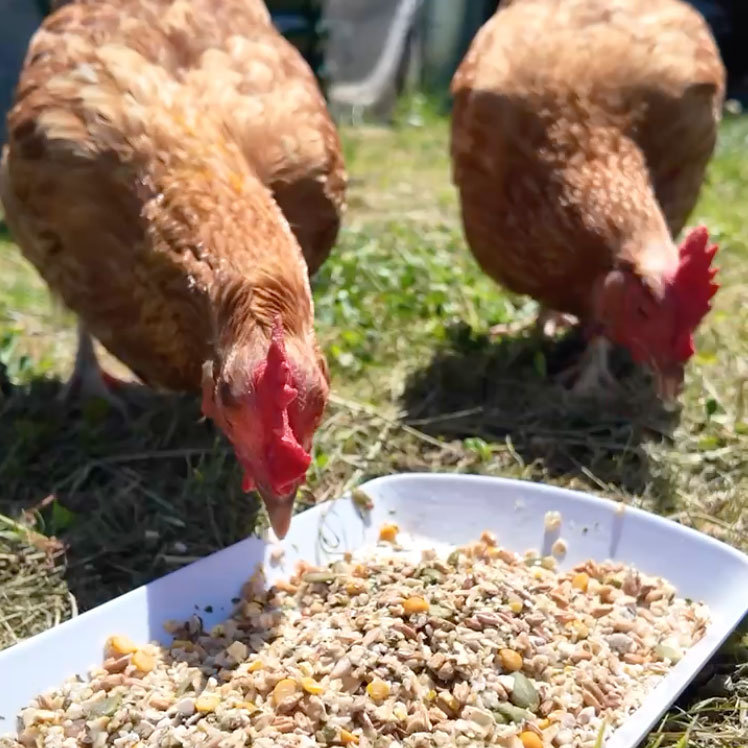
Choosing the Right Feeds and Treats
At Pipinchick, we make it easy to choose the right diet for your flock with our carefully selected range of trusted brands and natural treats. You’ll find:
- Fancy Feed Layers Pellets and Crediton Milling Layers Mash for reliable daily feeding.
- Fancy Feed Grower Pellets for young birds as they grow.
- Fancy Feed Mixed Corn and Supreme Mixed Corn to scatter in the run as an afternoon treat.
- Live protein-rich grubs such as mealworms, calci worms, and morio worms.
- Fun boredom busters like Silvermoor Alfalfa Peck Swingers, which keep hens busy and provide natural fibre.
- Natural supplements such as Natures Grub Garlic & Herb Superfood and Healthy Hen Herbs to support wellbeing.
By offering a mix of complete feeds with carefully chosen extras, you can give your flock the nutrition they need without risking overindulgence.
Feeding Tips for Happy Hens
- Offer treats in the afternoon so your hens have eaten their pellets first.
- Scatter corn or seeds to encourage natural foraging.
- Avoid sudden changes in diet, as this can upset digestion.
- Keep feeders clean and dry to prevent mould and bacteria.
- Rotate treats and extras to keep their diet interesting.
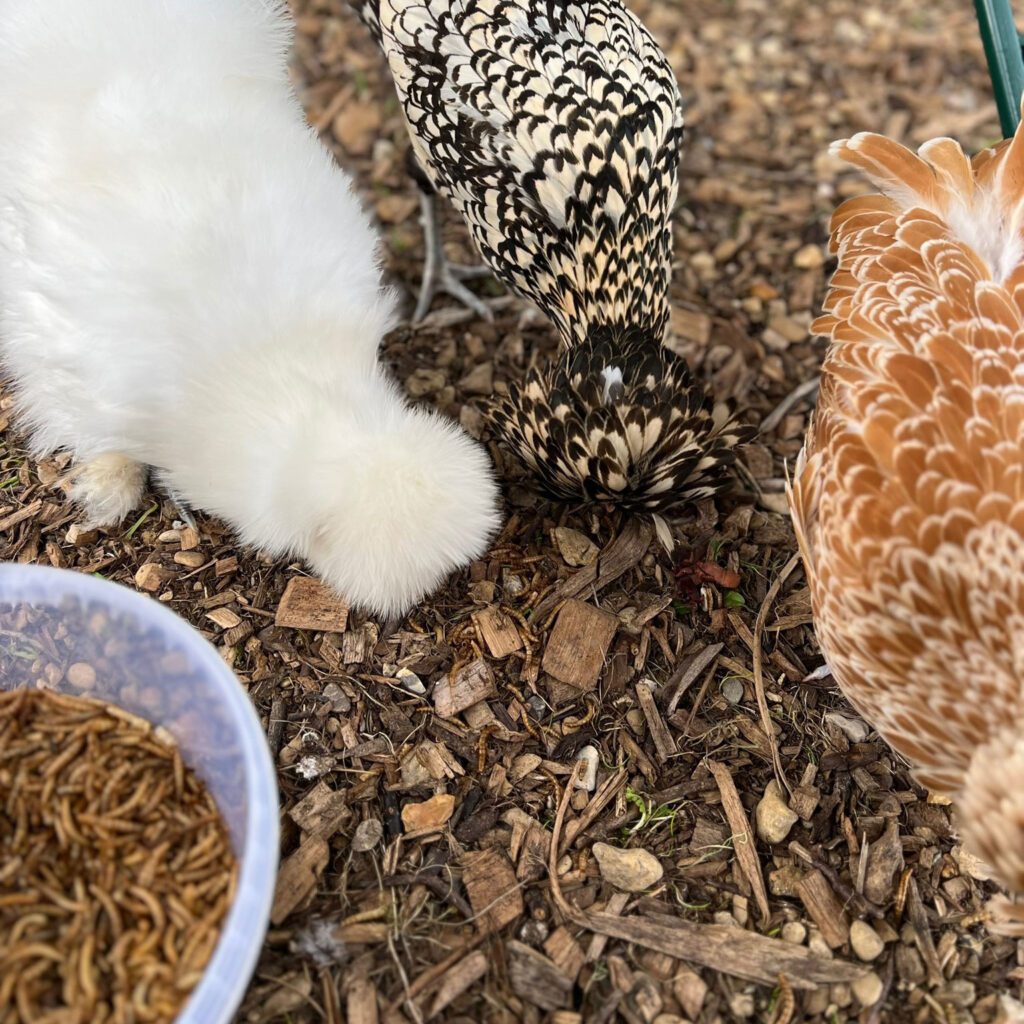
Keep Your Hens Thriving
Feeding your chickens properly is the foundation of good health, steady egg production and contented clucks. At Pipinchick, we don’t just supply happy, healthy chickens, we also provide everything you need to keep them thriving. From complete feeds and protein-rich grubs to natural supplements and fun treats, our range makes it easy to give your hens the best care every day.
Explore our Chicken Feed and Treats selection to find high quality corn and feed, plus exciting extras for your flock. With the right diet, your hens will reward you with strong shells, glossy feathers and plenty of eggs.
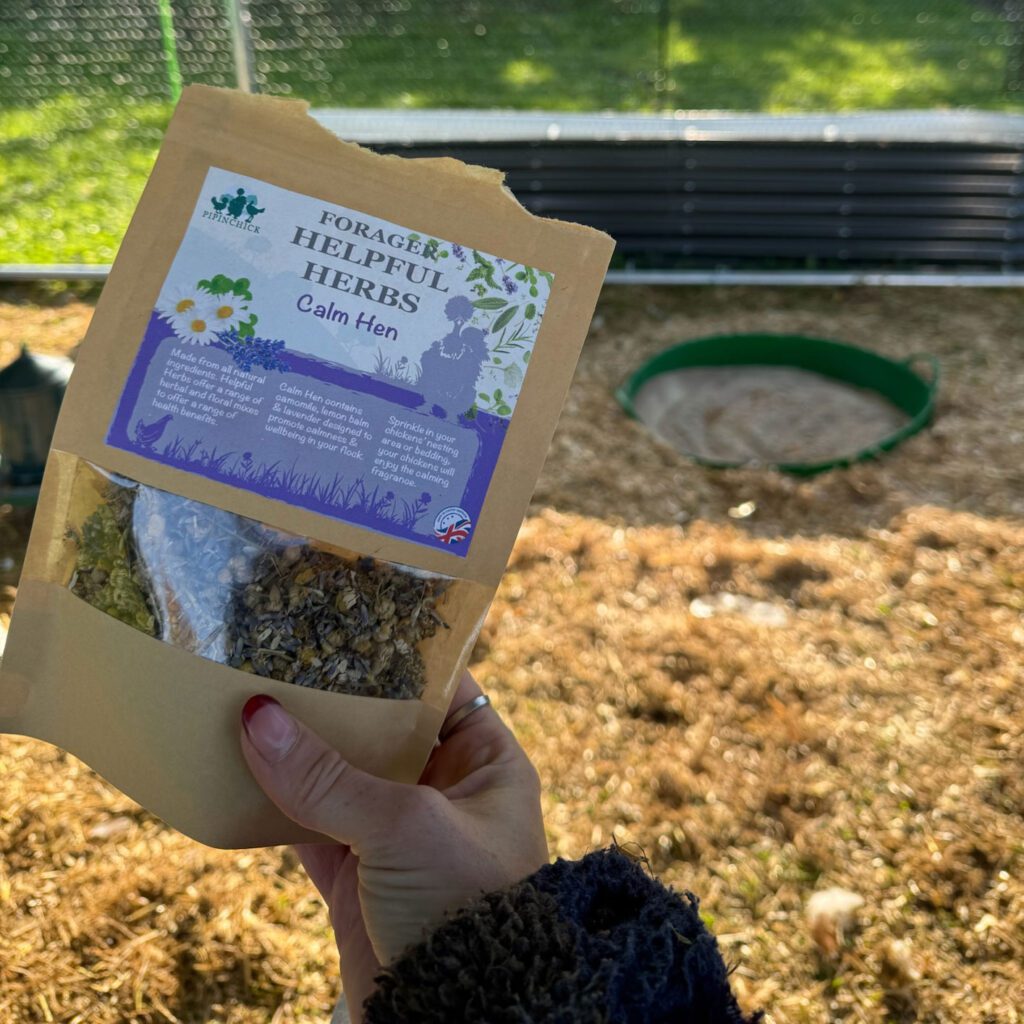
We all love giving our hens little treats from the kitchen, but not everything that’s good for us is safe for them. In fact, some foods can make your flock very poorly, and a few are outright poisonous. Knowing what not to feed your chickens is just as important as knowing what they should eat.
Dangerous Foods for Chickens
There are some foods that should never make their way into the run because they are actually very poisonous for chickens. These are the key ones to avoid:
- Avocado skins and pits – Avocados contain a toxin called persin. While the flesh is safe in tiny amounts, the skin and pits can cause breathing problems, heart failure and even sudden death in chickens.
- Raw or dried beans – Beans contain lectins, which are highly toxic if they’re not thoroughly cooked. Just a small handful of raw or dried beans can be fatal for your poor pet chicken.
- Raw green potato skins – Potatoes that have turned green contain solanine, a toxin that can affect the nervous system and cause serious illness. Cooked potatoes are safe, but avoid any with green skins.
- Rhubarb and tomato plants – The stems and leaves contain oxalic acid and solanine, both of which are harmful. Stick to ripe tomatoes only.
- Chocolate – A treat for us, but dangerous for chickens. The theobromine in chocolate is toxic to birds, just as it is for dogs.
- Apple seeds – Apples themselves are a healthy snack, but the seeds contain cyanide. A few seeds may not cause instant harm, but if eaten in quantity they can build up to a dangerous dose.
- Apricot pits and leaves – These also contain cyanide compounds and should be kept well away from your birds.
Foods That Can Cause Problems
Not all foods are instantly poisonous, but that doesn’t mean they’re good for your hens. These can cause health issues if fed regularly or in large amounts:
- Mouldy food – Whether it’s leftover pellets or old scraps, mould can cause digestive upsets and even infections such as vent gleet. Always feed fresh.
- Citrus fruits – While not toxic, citrus can interfere with calcium absorption and reduce egg production. Best to avoid.
- Onions – Large quantities can damage red blood cells and lead to anaemia.
- Wild mushrooms – Just as some fungi are toxic to humans, many are toxic to chickens. It’s safest to stop your hens eating any wild mushrooms in the garden.
- Lawnmower clippings – Although grass is fine, clippings ferment quickly, producing harmful bacteria and gases in the crop.
Why These Foods Are Harmful to Hens
Chickens have delicate digestive systems compared to us. They don’t produce the same enzymes to break down toxins, and their small bodies mean even tiny amounts of harmful substances can have a big impact. Problems can range from reduced egg laying and poor feather quality to sudden illness and, in the worst cases, death. By avoiding these foods entirely, you remove the risk.
What Can Chickens Eat?
The good news is there are plenty of safe, healthy and tasty options for your flock. A balanced diet should always start with a complete feed, as this ensures your hens get all the essential vitamins and minerals they need for growth, feathering and egg production.
At Pipinchick, we stock a wide range of trusted feeds from brands like Fancy Feed and Crediton Milling. These include:
- Fancy Feed Layers Pellets – a reliable daily feed that supports strong shells and steady laying.
- Crediton Milling Growers Pellets – ideal for young birds finding their feet.
- Fancy Feed Mixed Corn and Supreme Mixed Corn – a perfect afternoon treat to scatter in the run, keeping hens busy and content.
Protein-rich extras like mealworms, calci worms, and morio worms are brilliant for boosting nutrition, especially during moulting. And for a fun way to reduce boredom, our Silvermoor Alfalfa Peck Swingers give your hens something to peck at while adding valuable fibre.
Supplements also play a part in a healthy diet. Our Natures Grub Garlic & Herb Superfood and Healthy Hen Herbscan support immunity and egg quality naturally.
You can find out more about feeding your chickens here. (Link to other blog)
Tips for Feeding Your Flock Safely
- Introduce new foods slowly, watching for any changes in droppings or behaviour.
- Keep the run tidy. Remove uneaten food at the end of the day to avoid attracting pests or letting it spoil.
- Offer grit or oyster shell to support digestion and calcium levels.
By sticking to safe foods and high-quality feeds, you’ll ensure your flock gets the nutrition they need without the risks.
Find Healthy Feeds and Treats at Pipinchick
Looking after your hens means giving them the right balance of nutrition and care. At Pipinchick, we don’t just raise and sell beautiful, healthy chickens, we also stock everything you need to keep them thriving. From complete feeds and mixed corn to live grubs, natural supplements and boredom-busting treats, our range makes it easy to keep your flock both healthy and happy.
Explore our Chicken Feed and Treats and discover everything from staple feeds to seasonal extras. With the right diet, your hens will reward you with bright eyes, glossy feathers and a basket full of eggs.
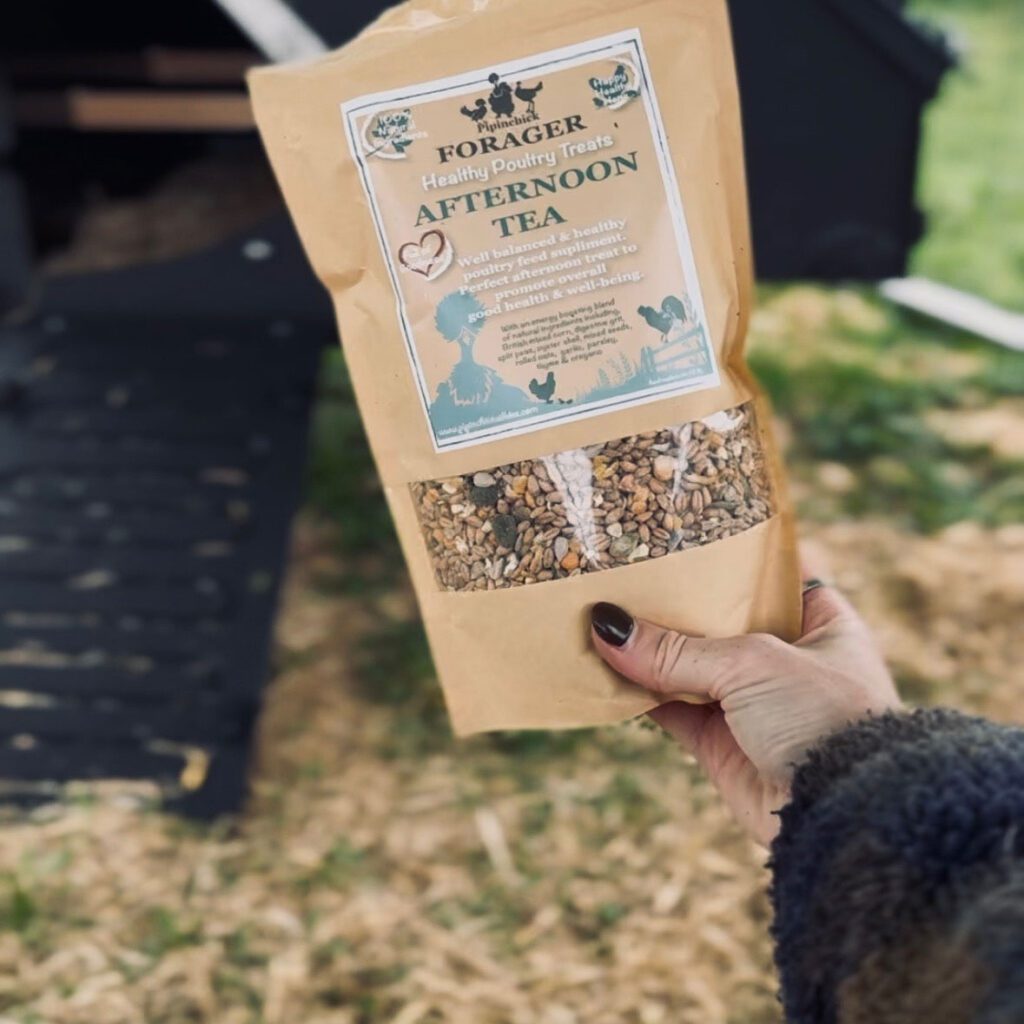
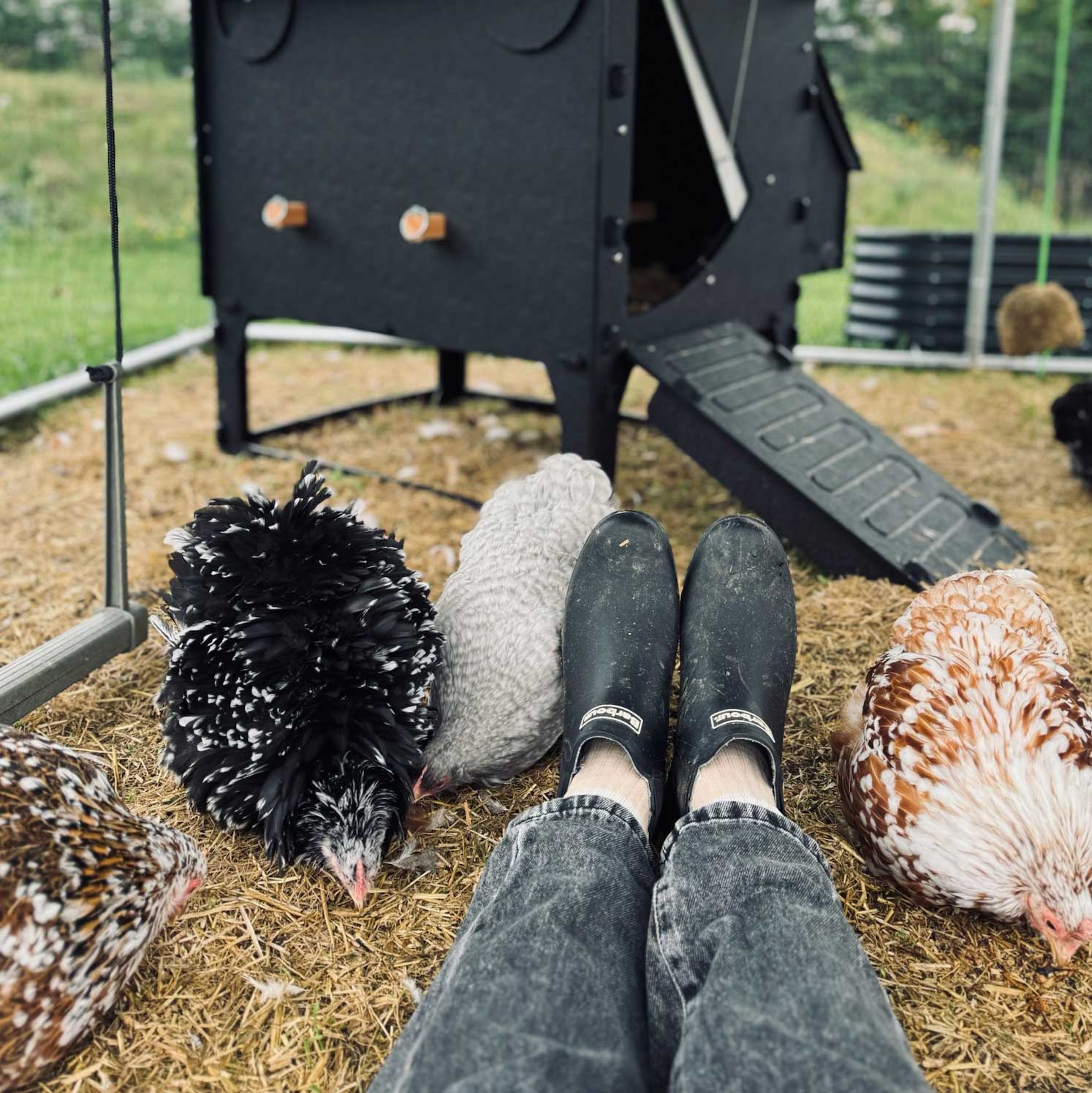
If you’ve been keeping chickens for a while, you’ll know the coop is more than just a shelter, it’s the heart of the flock. It’s where they feel safe at night, where they lay their eggs, and where they retreat to when the weather turns. Choosing the right coop can make all the difference to their health and happiness, and to your own daily routine. That’s why we’re proud to stock the brilliant range of Nestera chicken coops, designed by people who really know chickens, and built to make your life easier.
Nestera have been making waves in the chicken keeping world with their clever, low-maintenance designs. These aren’t your average coops, they’re made from 100% recycled plastic, which means they’re sustainable, weatherproof, and built to last. They come with a 25-year warranty, so once you’ve got one, you can tick “buy a new coop” off your to-do list for a very long time.
Easy to Clean – No Fuss, No Chemicals
One of the biggest chores for any chicken keeper is cleaning the coop. With traditional wooden houses, you’re often dealing with rough surfaces, awkward corners, and the need for chemical treatments. Nestera plastic coops are different. The smooth plastic surfaces mean dirt doesn’t cling, so most of the time a quick hose-down will do the job. For stubborn bits, a stiff brush and some water is all you need.
They also have removable droppings trays, which make mucking out quick and painless. And because plastic dries in minutes, there’s no waiting around before the hens can go back in – a real bonus if you’re doing a clean-out mid-day.
Built for All Weathers
British weather is unpredictable at the best of times, so a good coop needs to handle it all – rain, wind, frost, and the occasional scorching day. Nestera coops are made from 9mm-thick recycled plastic that won’t rot, warp, or split. They’re insulated enough to keep hens cosy in winter, yet ventilated for summer comfort.

Which Nestera Coop is Right for You?
Here at Pipinchick, we’ve chosen to stock the models we know work brilliantly for different flocks and garden setups:
Nestera Large Chicken House – Ideal for bigger flocks or if you like giving your hens extra space to stretch out. The large design is perfect for standard breeds and is easy to access for cleaning and egg collection.
Nestera Large Chicken Lodge – Combines generous internal space with raised legs, giving your hens a sheltered spot underneath. Great for wet weather and shade in the summer.
Nestera Medium Chicken House – A solid choice for smaller flocks or where space is limited. Still roomy, still easy to clean, and still with all the same red mite-resistant benefits.
Nestera Medium Chicken Lodge – Offers that handy raised design but in a more compact footprint. Perfect for gardens where space is at a premium.
Nestera Small Chicken House – Best for bantams or just a few hens. Same top-quality build, just scaled down.
Nestera Small Chicken Lodge – A petite raised option, giving your birds both indoor comfort and outdoor cover in one tidy package.
Designed by Chicken Keepers, for Chicken Keepers
Nestera’s team are experienced poultry owners, so they’ve thought of the little details that make a big difference. Modular panels and quick-release clips mean the whole coop can be taken apart for a deep clean and put back together in minutes. Multiple access points make it easier to reach every corner. The perches are sized for chicken feet, and the nest boxes are spacious and inviting.
Recycled Plastic Chicken Coops - Better for the Planet
We love that Nestera coops are made from recycled plastic and can be recycled again at the end of their life. They’re manufactured using green energy, so they’re a genuinely sustainable choice. You get a coop that’s great for your hens and better for the environment too.

Happy Hens, Happy Keepers
Customer feedback on these coops has been overwhelmingly positive. People love how sturdy they are, how quick they are to clean, and how much their hens enjoy them. We’ve seen time and again how a well-designed coop can make chicken keeping more enjoyable, and these are some of the best we’ve found.
If you want a coop that’s built to last, easy to maintain, and genuinely improves life for both you and your flock, a Nestera model from our range is well worth considering. Whether you go for the House or the Lodge, Large, Medium, or Small, you’ll be getting a smart, sustainable, and hen-approved home.
Browse our full Nestera range today and find the perfect match for your flock, your chickens will thank you for it.

British summers can be a bit unpredictable. One minute you’re pulling on a jumper, the next you’re wondering if your hens might like to borrow your sun hat. While most chickens can cope with a bit of warmth, those long, hot spells can cause them real stress if we don’t step in to help. Overheating can lead to dehydration, reduced egg laying, and in extreme cases, serious health problems. The good news is that with a little planning and some clever tricks, you can keep your flock happy and comfortable when the temperature rises.
Do Chickens Struggle in the Heat?
Chickens don’t sweat like humans do, so when it gets hot, they have to rely on panting and holding their wings out to help release heat. This works to a point, but in prolonged heatwaves, it can become a real challenge for them. Older hens, heavy breeds like Orpingtons, and hens with very dark plumage can be more susceptible to heat stress. Even in the UK, where we’re not exactly known for tropical weather, we’ve seen enough hot spells in recent years to make summer planning a must for any chicken keeper.
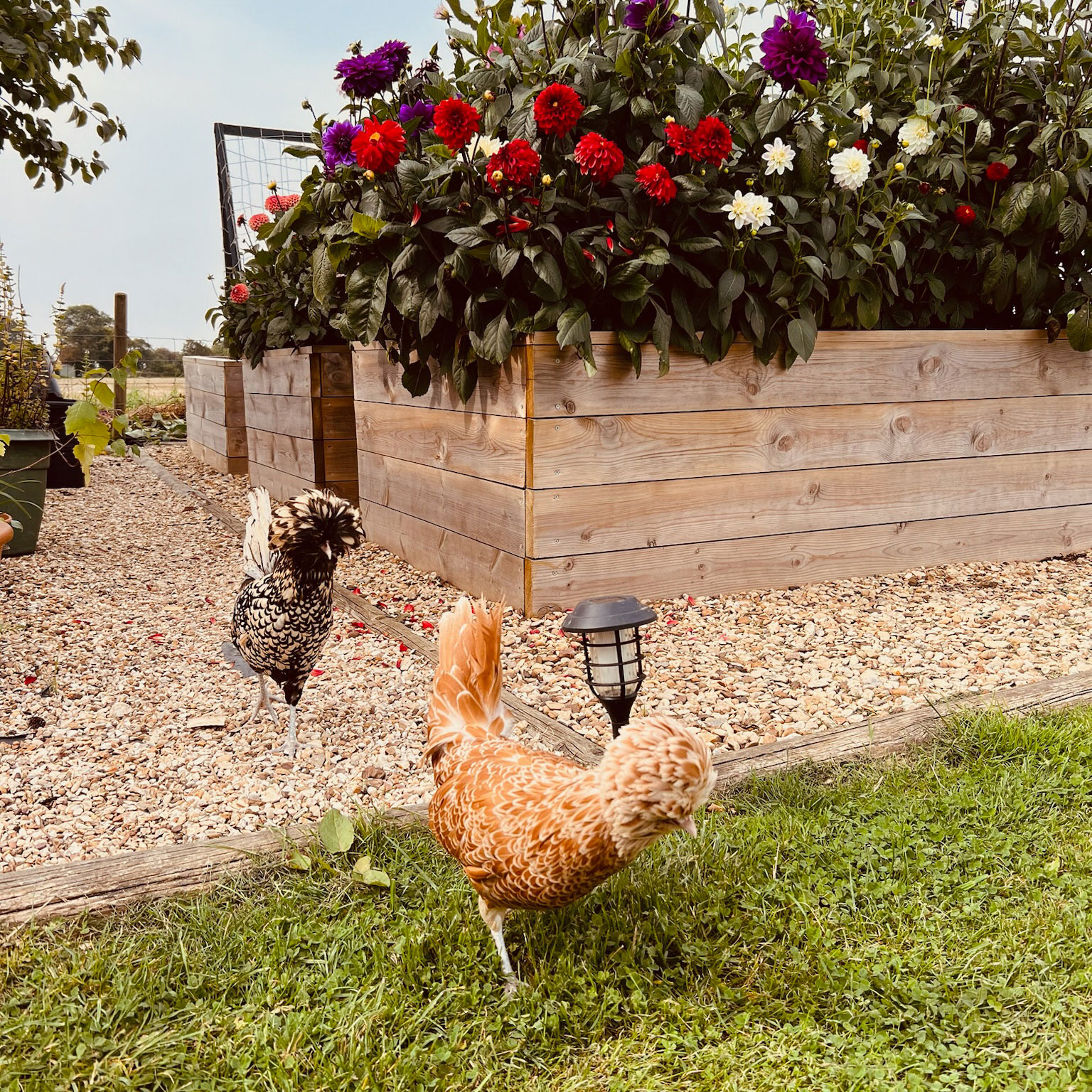
Spotting the Signs of Heat Stress in Chickens
Knowing when your hens are struggling is half the battle. Keep an eye out for:
- Panting or breathing with an open beak
- Holding wings away from their bodies
- Looking lethargic or standing still in the shade
- Reduced appetite or water intake
- A sudden drop in egg production
If you notice these signs, it’s time to act quickly to help them cool down.
Provide Plenty of Shade
Shade is your hens’ first line of defence against the summer sun. Make sure they have access to shaded spots throughout the day, as the sun’s position changes. Trees and shrubs are perfect natural shelters, but you can also rig up temporary tarpaulins, garden parasols, or even old sheets to create shaded areas. If you use a fixed run, consider covering part of it with shade cloth so there’s always a cooler retreat.
Keep the Water Fresh and Cool
Fresh, cool water is essential in hot weather. Check drinkers regularly throughout the day and top them up as needed. In very hot spells, adding a few ice cubes to the water can help keep it cooler for longer. Place extra water stations in different parts of the garden or run, so there’s no crowding or competition. Shallow trays of water can also be offered for them to paddle in if they’re curious enough, though not all hens will go for it.
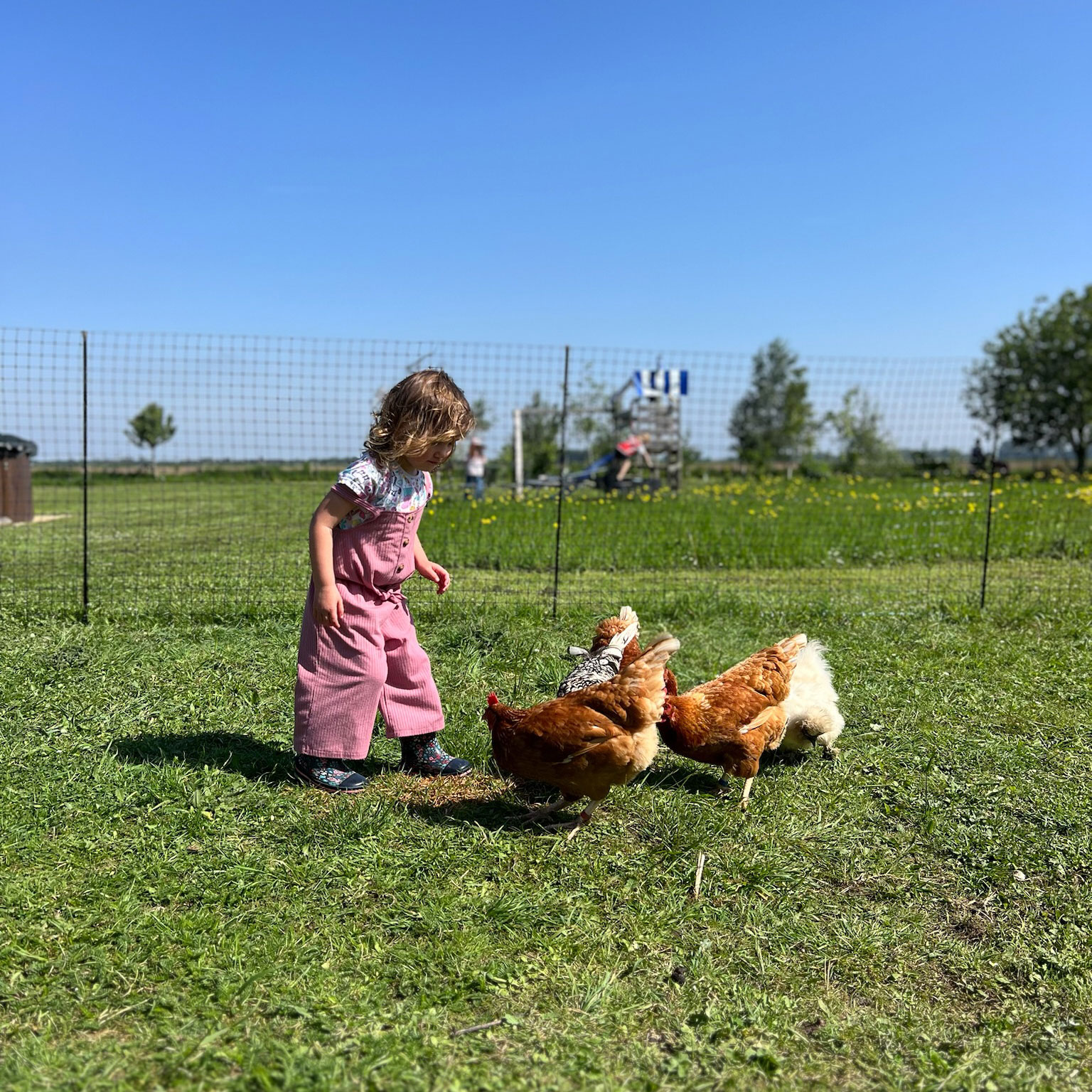
Ventilate the Coop
A stuffy chicken coop on a summer night is no fun for your hens. Make sure there’s plenty of ventilation to allow hot air to escape and cooler air to circulate. Keep windows and vents open, but ensure they’re still predator-proof with mesh. In wooden coops, you might consider adding extra vents if airflow is poor. Avoid placing bedding too deep in summer, as it can trap heat.
Cool Treats Chickens will Love
Summer is the perfect excuse to spoil your flock with some refreshing snacks. Chilled watermelon is a big hit with most hens and provides extra hydration. Frozen peas or sweetcorn can be scattered for them to peck at, giving them a fun activity and a cool nibble. Just remember that treats should only make up a small part of their diet, so don’t go overboard.
Change Your Routine
In very hot weather, it can help to adjust your hens’ routine. Let them out earlier in the morning to make the most of the cooler hours, and try to encourage rest in the shade during the hottest part of the day. Evening is a good time to offer a final feed and check everyone’s looking lively before bedtime.
Dust Baths in the Shade
Dust bathing is more than just a chicken spa day – it helps keep them clean, parasite-free, and cool. Make sure their dust bath area is in a shaded spot during summer, or move a favourite container into the shade. You can add a little dry soil, sand, or diatomaceous earth to keep it fresh and inviting.
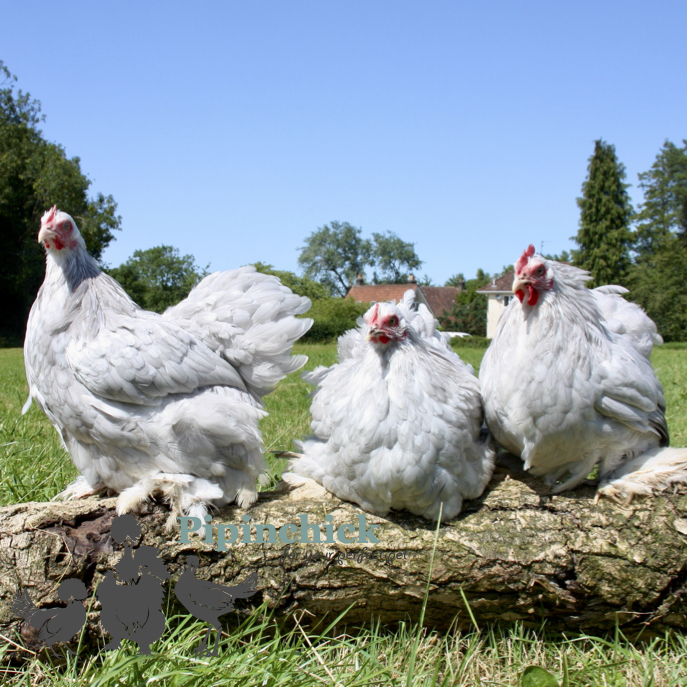
Frozen Water Bottles and Cold Tiles
A handy trick for smaller runs or enclosed spaces is to freeze large bottles of water and place them where your hens like to rest. They’ll naturally gravitate towards the cooler area. Similarly, paving slabs or tiles chilled in the shade can give them a cool place to stand.
Keep Feed Dry and Fresh
Hot weather can make feed spoil more quickly, especially if it’s stored in direct sunlight. Keep feeders in the shade and avoid overfilling, topping up little and often instead. This helps keep the feed fresh and reduces waste.
Stay Calm and Keep Chickens
It’s easy to panic when you see your hens panting, but with these steps in place, most will cope perfectly well with a British summer. The key is providing shade, ventilation, and plenty of cool, fresh water, while keeping a close eye out for signs of distress. A few simple adjustments to their environment and routine can make a huge difference to their comfort and wellbeing.
If you’ve been thinking of starting your own flock but have worried about summer care, don’t let the warmer months put you off. With the right setup and a little daily attention, your chickens will take summer in their stride – and reward you with eggs, entertainment, and that unbeatable chicken-keeper satisfaction.
At Pipinchick, we celebrate the joy of chicken keeping and the simple pleasure of raising a happy, healthy flock. By providing a natural environment, a nutritious diet, and plenty of opportunities for foraging, you’ll be rewarded with happier hens—and the best-tasting eggs you’ve ever had.
Our live chickens are for sale online, and Pipnchick are the UK’s number one most trusted pet poultry provider. We deliver happy, healthy chickens safely to your door. All our chickens are reared lovingly by us on our farm in the beautiful Chew Valley, just outside Bristol. Our breeds include Silkies, Bantams, and pure breed chickens as well as a whole range of high quality chicken keeping supplies.

